#except that out of the two this is the one that is historically accurate
Text
All of France have been protesting the most recent laws Macron has been pushing and today i'm seeing a fucking tweet from "Youth with Macron" about how Macron now set up a "Free condoms in pharmacy for people under 25" campaign, which has for slogan, and i kid you not, "Make love, not protest :)" i'm going to yell i'm going to yell i'M GOING TO YELL MACRON YOUR PEOPLE WANT TO KILL YOU MACRON THEY'RE SINGING ABOUT BEHEADING YOU WHAT ARE YOU DOING.
#MAKE LOVE NOT PROTEST??? MAKE LOVE NOT PROTEST?????????????????#it's a wordplay bc 'Make Love Not War' is said 'faite l'amour pas la guerre'#and war (guerre) and the specific type of protest where you skip work to go in the street and block things#is called a grève so it sounds similar#BUT HOW DO YOU DO A CAMPAIGN ABOUT 'DONT PROTEST GO FUCK INSTEAD'#DURING 'EVERYONE IS GETTING MURDEROUS ABOUT YOU' PROTEST#IM LOSING MY MIND IM LOSING MY MIND IM-#sorry being french on main again but 1) troubled times currently#2) with my En!Twt dead i spend more time on my Fr!Twt that i use to keep up with the news anyway#please im going tO CRY 'MAKE LOVE NOT PROTEST'?????????????????????????????#ichatalks#yknow how ppl keep saying Marie Antoinette's last words were 'let them have cake'#over the revolutionary crowd that was starving#and that it's historically false (she never said that and her last words were 'oh i'm sorry' bc she walked on the foot of her executioner)#well 'make love not protest' is probably much more accurate to the feeling 'let them have cake' is supposed to give#ie: the tonal dissonance of completely missing out how much your people want you dead#except that out of the two this is the one that is historically accurate#losing my MIND#also yes idk how much macron had a say in this slogan at all#and how much is just the org supporting him#buT YOU CAN SEE WHY IM ?????????
14 notes
·
View notes
Text
Say what you will about Van Helsing 2004; hate it, love it, be indifferent, But the All-Hallow's masquerade ball went sooooo hard and it had zero right to do so! It's a fun, campy, monster mash movie with wonderfully dated ( and expensive) cgi and non-stop action meant to be a popcorn flick one takes out to watch around spooky season. And it has this* chef's kiss* GORGEOUS 6 minute sequence plopped arbitrarily in the second act, which unexpectedly surpasses nearly every other ball in the last 30+ years of film( notable exception being the Cinderella 2015 ball) for literally no reason other than to be dramatic af.
Like feast your eyes on this Gothic masterpiece!!! Who doesn't want to immediately live in this picture?!??
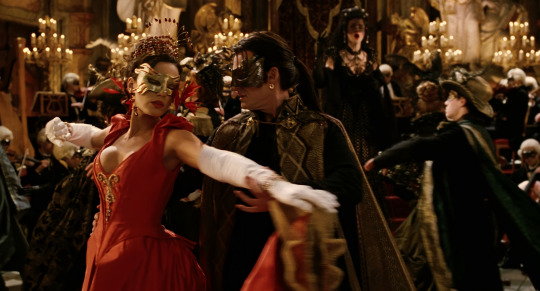
They used those candles with oil in them so that they would have real candles, real string orchestra( I believe), probably around 100 real life extras( something which is tragically absent in modern film), said extras are all in beautiful fully decked-out costumes( which are in luxuriously dark colours, but nearly no fully black, another thing you cannot say for much modern cinema), REAL CIRQUE DU SOLEIL PERFORMERS for all the acrobatics!!!! Hell, instead of filming in a sound stage, where they could control the reverb and the acoustics and the size of the set and the bloody lighting ( they apparently had a heck of a time emulating the firelight for this sequence) and the temperature( it's very cold in stone churches!) better, they filmed in a Baroque church in Prague! As I said, peak dramatic splendour, jfc...

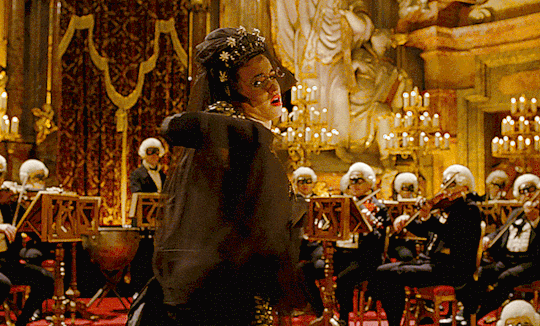
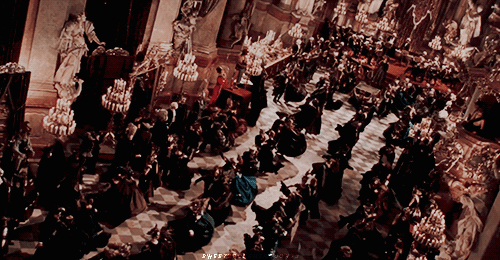
Think about that a second...They filmed a vampire masquerade in a Baroque Catholic Church( St. Nicholas' in Lesser Town, if you were curious) with amazing over-the-top acoustics and marble statues and real, tiled floors and marble pillars and a choir loft which they very much utilized, covered the pipe organ and the altar with a grand brocade curtain so it wouldn't be so obviously a, you know, a church! And there's a gold gilt elevated and canopied pulpit into which they put two vampire kiddies for, again, the sake of being dramatic.
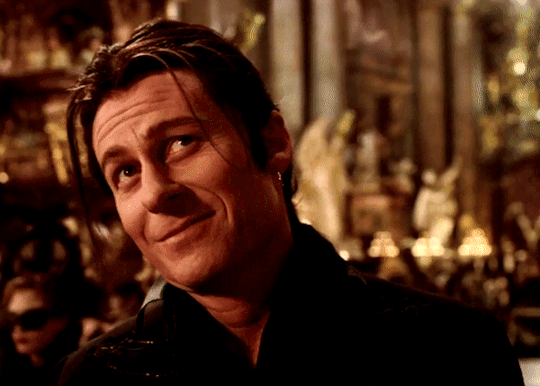
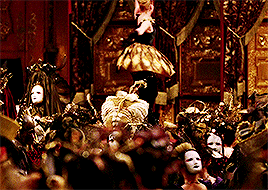
And the costumes! They remind me of the 25th anniversary Phantom of the Opera Masquerade costumes. Same quality, like they're old, well-cared-for costumes pulled out of a warehouse, instead of fast industry churn-outs. With lots of trim and colour and masks and lace and feathers and..just...ugh.. they are all perfect! Just look at all the head pieces on the ladies and the hats on all the gentleman ( save Dracula of course) and the powdered wigs on the musicians. ANNNNDD! The dresses are historically correct!!!!!! It's the 80's bustle era! Nobody does the 80's bustle era in film anymore and it's a bummer. Oh and one other thing! Anna's ( and other women's) hair, at least here in the ball, is also historically accurate because it's all pinned up! None of those fucken modern beachwaves at a ball! Everybody's got updo's!
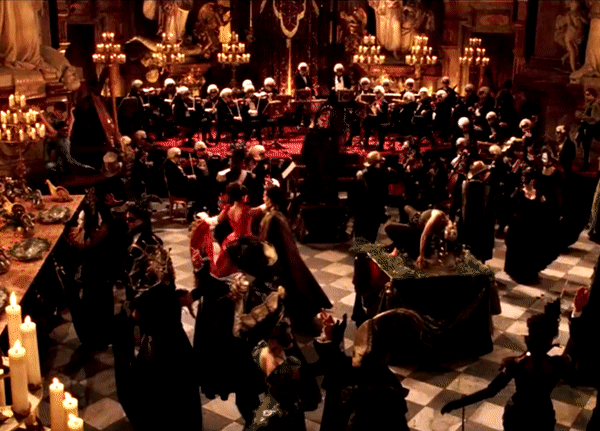
Gah, I swear, Dracula in his gold cloak really does things to me in this scene!

By the way, the acrobatics are bonkers in here for just background stuff!! Especially the random guys on unicycles and the dude playing the violin whilst standing on a ball...Like....WHAT?
Anyways, all this to say, that this masquerade ball feels sooo real and tangible and because of that it blows every other film out of the water, and no, I will not change my mind!!!!!
Here's a few more gifs, bcuz, why the hell not, this scene is sexy as fuu*ck?
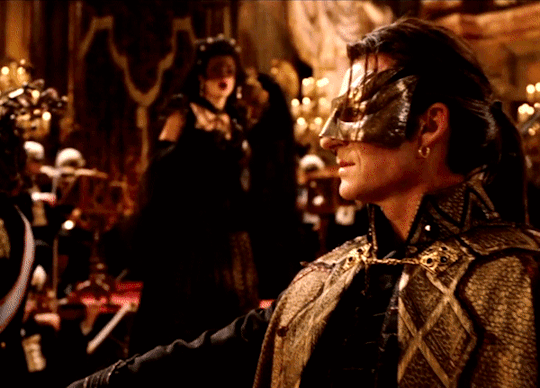
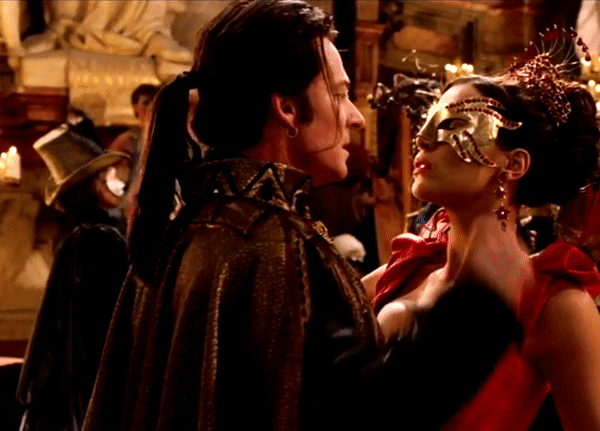

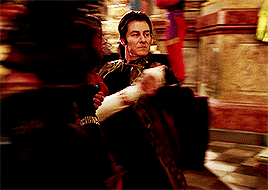
Alright I need to go to bed now.
#van helsing#van helsing 2004#dracula#count dracula#cinderella 2015#I'm on a film rant#masquerade ball#vampire#vampire masquerade ball#practical effects#costumes#gorgeous gorgeous set#baroque church#count vladislaus dracula#cirque du soleil#WHY IS THIS SOOO GOOD????????#princess anna valerious#kate beckinsale#richard roxburgh#phantom of the opera 25th#very phantom of the opera-esque
2K notes
·
View notes
Text
How to cook in a medieval setting
Alright. As some of the people, who follow me for a longer while know... I do have opinions about cooking in historical settings. For everyone else a bit of backstory: When I was still LARPing, I would usually come to LARP as a camp cook, making somewhat historically accurate food and selling it for ingame coin. As such I know a bit about how to cook with a historical set up. And given I am getting so much into DnD and DnD stories right now, let me share a bit for those who might be interested (for example for stories and such).
🍲Cooking at Home
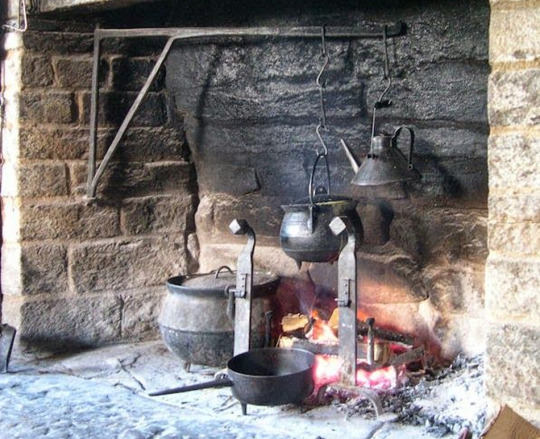
First things first: For the longest time in history most people did not have actual kitchens. Because actual kitchens were rather rare. Most people cooked their food over their one fireplace at home, which looked something like what you see above. There was something made of metal hanging over the fireplace. At times this was on hinges and movable, at times it was set in place. You could hang pots and kettles over it. When it came to pans, people either had a mount they would put over the fire or some kind of grid they could easily put into place there with some sourts of mounts (like the two metal thingies you can see above).
If you have a modern kitchen, you are obviously used to cook on several cooktops (for most people it is probably four of them), while in this historical you obviously only had one fire. Of course, as you can also see in the picture above, you could often put two smaller pots over the flames or put in a pan onto the fire additionally. But yes, the way we cook in modern times is very different.
Because of this a lot of people often ate stews and soups of sort. You could make those in just one pot - and often could eat from the same stew for days. In a lot of taverns the people had an "everything stew" going, which worked on the idea that everyone just brought their food leftovers, which were all put into one pot everyone would eat from.
Now, some alert readers might have also noticed something: What about bread and pastries? If you only have one fireplace and no oven, how did people make bread?
Well, there were usually three different methods for this. The most common one was communal ovens. Often people had one communal oven in a neighborhood. Especially in a village there might just be a communal oven everyone would just put their bread in to bake. (Though often this oven would only be fired up once or twice a week.)
The second version to deal with this some people used was a sort of what we today call a dutch oven. A pot made either of metal or clay with a lit you would put into the hot coals and then put bread or pastries into that, baking it like that.
There was also a version where people just baked bread in pans on the fire, rotating the bread during the baking process. At least some written accounts we have seem to imply. (Never tried this method, though. I have no idea how this might work. My camp bread was mostly done in dutch ovens or as stickbread.)
Keep in mind that the fireplace at home was very important for the people in historical times. Because it was their one source of warmth in the house.
🏕️ Cooking at Camp

Technically speaking cooking at camp is not that different - with the exception of course that you have to drag all your supplies along. And while in Baldur's Gate 3 and most other videogames you can carry around several sets of full-plate armor and several pounds of ingredients so that dear Gale can whip something up... In real life as an adventurer running around you need to make decisions on what to take along.
If you have read Lord of the Rings, you might remember how many people have criticized Sam for actually dragging all his cooking supplies along and how sad he was for not being able to cook for most of the time, because they were very limited in taking ingredients along.
So, yes, if you are an adventurer who is camping out in the open, you will probably need to do a lot of hunting and gathering to eat during your travels. You can take food for a couple of days along, but not for a lot.
A special challenge is of course, that while you can cook food for several days when you are at homes, you do not want to drag along a prepared stew for several days. So usually you will cook in smaller batches.
A lot of people who were journeying would often just take along one or two pots along.
So, what would you eat as an adventurer travelling around while trying to save the world from some evil forces? Well, it would depend on the time of the year of course. You would probably hunt yourself some food. For example hares, birds or squirrels. Mostly small things you can eat within one or two days. You do not want to drag along half a dead deer. In the warm months you might also forrage for all sorts of greens. You also can cook with many sorts of roots. Of course you can also always look into berries and other fruits you might find.
Things you might bring with you might be salt and some spices. A good thing to bring along would be herbs for tea, too, because I can tell you from experience that water you might have gotten from a river does not always taste very well - and springs with fresh water are often not accessible.
Now, other than what you can access the basic ideas of camping fires and cooking with them has not changed in the last few thousand years. While modern people camping usually have a car nearby and hence will have access to a lot of ingredients. But the general ideas of how to build a fire and put a pot over it... has not really changed.
So, yeah.
Just keep in mind that for the most part in historical settings until fairly recently, there was not much terms of proper kitchens. People cooked over an open fire and hence had to get at times ingenius about it.
#dungeons & dragons#baldurs gate 3#lord of the rings#medieval europe#medieval#cooking#medieval cooking#food history#historical settings#history#european history#writing#fantasy#writing resources
1K notes
·
View notes
Note
Anon here! I just saw that your requests are open for Batfam? If you’re still taking requests can you do a regency era Damian Wayne x reader. If you don’t want to do Damian I wouldn’t mind any of the batboys!
xxx
I am always taking requests (they're for my sanity) except for the next three days because I'm on a plane, busy, or sleeping :/
(for this fic, they are Bruce's biological kids) (not completely historically accurate. like at all. but i tried)
Masterlist
Jason Todd x (probably fem due to the law back then unless you want to dream that being gay was allowed in 1817 (some sources also state that lesbianism was never illegal, but I don't know for sure. Just found it interesting))!Reader
Regency Era AU
The poor man is being swarmed by potential— and in all honesty, very desirable— women and their family members who are desperate to introduce the most suitable option for his wife from their family line. Constantly ignoring beginnings of phrases such as "this is the honourable—" and "perhaps you would like to be introduced to my lovely daughter—", and with each one his jaw ticked.
You hide your smile behind your fan, gazing at him from across the ballroom. It is the marriage season and your childhood friend clearly hated it. But that was expected of him as the second son of Bruce Wayne, Duke of York and member of the royal family. Especially since the duke's eldest, Marquess Richard, had recently married a young woman, Marchioness Barbara.
Locking eyes with the green you have known for so long, you tap the top of your open fan. I wish to talk to you.
With abundant relief, he shoos off one particularly frustrating Earl and almost rushes to be by your side. "Thank you," he says sincerely, a smile stretching his face.
"Why do you not wish to talk to them?" you inquire, Jason's smile dropping subsequently. "They are fine young women, after all."
"They're boring," he sighs, "I do not wish to be married to someone who's personality is dull."
"They're not dull," you chide, and he raises a brow. "They are just taught to be agreeable and respectful, my Lord."
"If I asked them about my theory of a novel I am reading, they would simply say, 'Well if you think so, it must be true' and not..."
"Something like I'd say?"
"Exactly."
You suspect it's a common theme with the Waynes; they're seemingly more inclined to look for a spouse that challenges their opinions and joins them in their love of science— the recently wedded Wayne couple bonded over their love of physics, in fact. A quality like that in a women was usually seen as undesirable.
When you were younger and your father made you visit the Waynes, you learned about sciences that your father would've frowned upon; even the daughters, though there were only two, enjoyed the conversations like you did. With Jason and the youngest son, Damian, you would have lengthy conversations about the novels you were reading altogether; these conversations happened so often that their father was tired of having three copies of every novel he owned.
"I have an idea," Jason says, straightening to his full height beside you— tall enough for you to need to tilt your head up if you wanted to look him in the eyes (you always did— something that beautiful was designed to be looked at). "What if you and I get married?"
"You can't be serious."
"Why wouldn't I be?"
You consider him for a moment— you really do— and see no sign of a lie or joke behind his offer. And now that you think about it, it wouldn't be terrible. It was better than your father marrying you off to some old man you didn't know.
Or weren't attracted to.
"Usually there's a dance or two before the proposal," you point out almost teasingly, "And then courtship. For at least a few months. Don't forget, a man should dance with multiple women before deciding who he wishes to wed—"
"Fine," he sighs, rolling his eyes. Yet a small grin remains on his face. "Would you like to dance, then?"
"Hmm, let me think—"
Jason pointedly fake-yawns while playfully glaring your way.
"I would appreciate a dance, yes." And with that, he leads you to the centre of the ballroom, passing his father who watches the two of you with confusion as you begin to dance.
"Are they—"
"Relax, dear," his wife Selina interrupts while lightly leaning against him, also watching the two of you dance, a smile on both of your faces as you whisper quiet yet teasing words to each other. "Don't tell me you couldn't see it before?"
Her husband's silence answers for him.
240 notes
·
View notes
Text
The biggest Easter egg yet
I’ve been meaning to address this for a while now, but @camdenleisurepirates gave me the final push after reading my piece on Gabriel’s cross. Huge thanks for that morsel of motivation, my ADHD brain loves you.
This is going to be yet another long read, although not as extensive as my bookshop statues meta. Still, better get yourself some hot chocolate or another drink of your choice and make sure you’re comfortable!
Now, remember the X-Ray interview with Peter Anderson on Easter Eggs in the opening animation he created for the second season? Forget red herrings, apparently our fandom has a literal red phone box! I’m convinced that this whole scene is a one big — the biggest, actually — Easter Egg, and I’ll explain why step-by-step.
The red phone box Crowley used to warn Aziraphale about the Antichrist and the following Armageddon in S1, the exact one where he left change for an emergency call, seems important enough in terms of the future S3 plot, but there’s so much more going on in this frame. Not only the lift.
The angels
At the very start of this sequence we can see a fragment of an elaborate bridge guarded by cherubs sitting on two columns, maybe globes, leading to a distant structure built over a literal mountain of trash — all elements of the S1 and S2 openings which were consciously picked out by the animators and put together in a very ominous pile.
Ready for some scavenging?
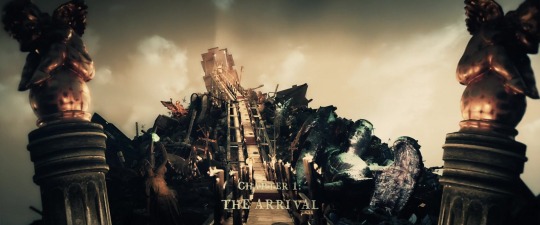

In the Gabriel’s cross meta, I already mentioned the importance of Ponte Sant’Angelo in relation to the ex-Archangel’s statue. Now it’s time to widen our perspective and focus on the full picture — quite literally. Apparently the bridge from the opening sequence has ten statues of angels, exactly as the Italian historical monument.
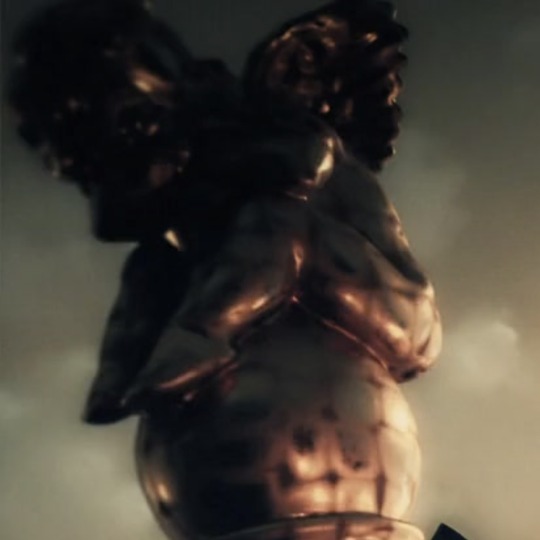
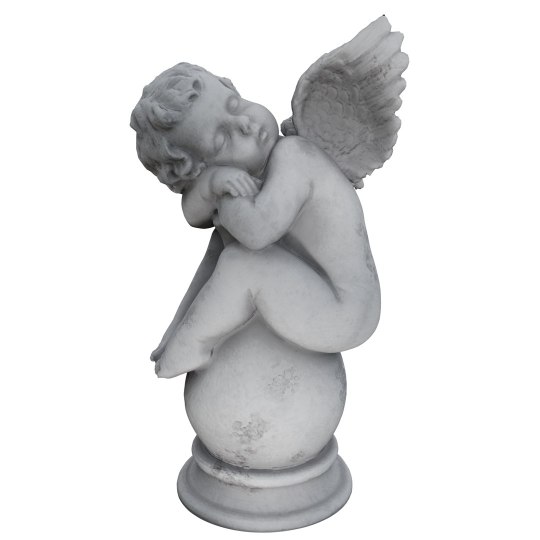
First things first though: the two big cherubs guarding the entry to the bridge might seem familiar to some of you. While they’re obviously not copies of the same statue, a very similar pair of brass cherubs is placed in Aziraphale’s bookshop to symbolize Aziraphale and Crowley. And looking at the screenshot above and the way they sleep or sulk with their backs turned on each other, they are most certainly not talking. The addition of more than one set of eyes is a lovely reference to biblically accurate angel memes though.
If we assume the traditional left-right positioning of the characters, Aziraphale is on the left and Crowley is on the right. Directly behind Aziraphale we can see a ship named “Good Traits”, but in reverse — kinda sorta confirmed by the animator Peter Anderson to be connected to the concept of the seven deadly sins on Twitter. Same that was mentioned recently by Neil in one of his asks.
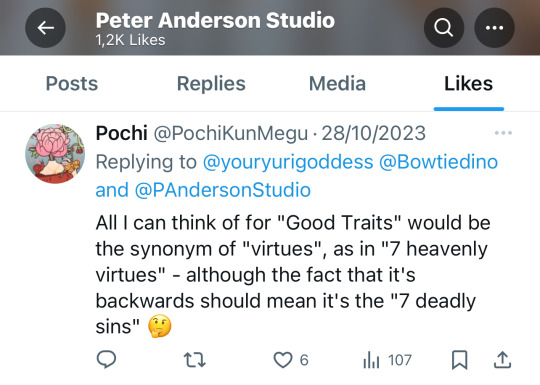
The presence of Gabriel — a renegade Archangel wielding a broken cross — on the right, Crowley’s side, seems to match this theory. It could also support one of the possible interpretations of the very last bookshop shot in the S2 finale.
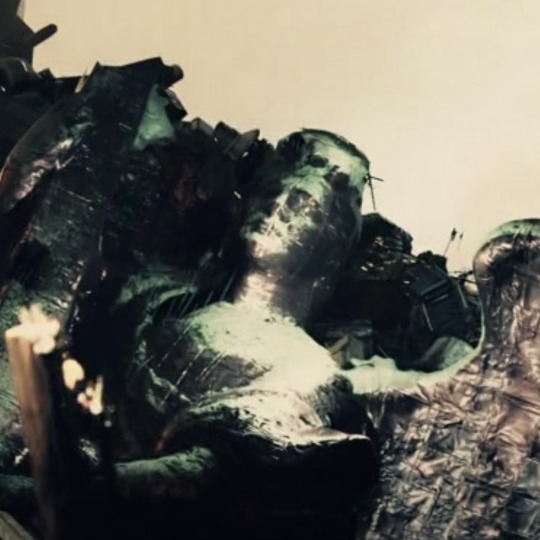
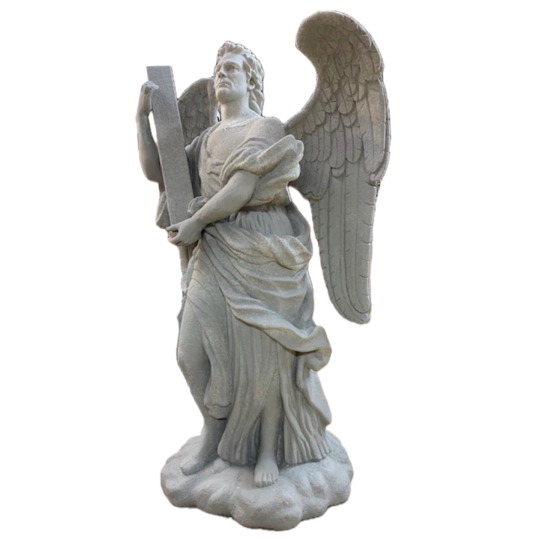
Out of all ten statues, Angel Carrying the Cross by Ercole Ferrata is considered inferior to the others on the bridge in that it appears to be a two-dimensional relief sculpture rather than an unbounded three-dimensional artwork, which seems to match Gabriel’s first impression as a character.
The inscription on the statue reads, “Dominion rests on his shoulders" — that is the weight of the cross that Christ was forced to carry through Jerusalem before being crucified. Even though Gabriel’s burden partially disappeared, the whole bridge and its environment is covered with crosses. It’s clear that we’re looking at a direct parallel of Via Crucis, the Way of Sorrows.
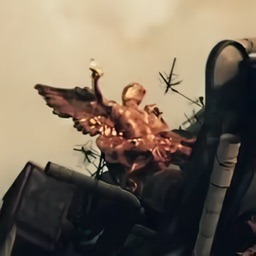
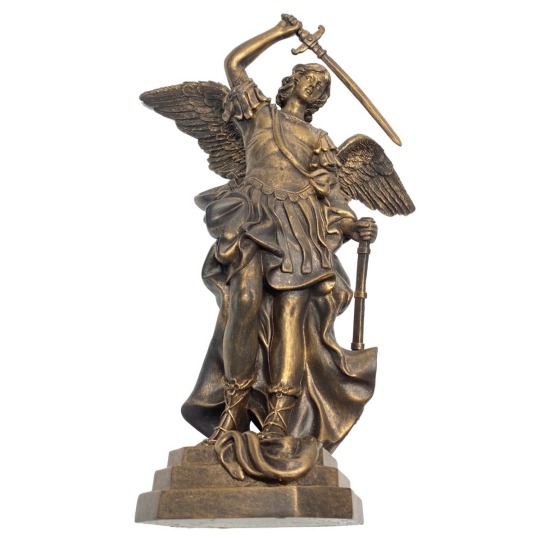
Towering over the Italian bridge, at the very top of Castel Sant’Angelo, is a statue of Archangel Michael, seen as the golden angel on the top left part of the trash pile. Aziraphale’s side, perhaps as his assistant, perhaps a rival? Legends of the Jews mention Michael as the chief of a band of angels who questioned God's decision to create man on Earth. The entire band of angels, except for Michael, was condemned to Fall — which could explain why they have such a good access to the Grapevine That Obviously Doesn’t Exist. And whatever’s going on between Michael and Dagon, perhaps.
In Roman Catholic teachings, Michael has four main roles or offices. Their first role is the leader of the Army of God and the leader of Heaven's forces in the final triumph over the powers of Hell. Viewed as the angelic model for the virtues of the spiritual warrior, their conflict with evil taken as the battle within. The second and third roles of Michael deal with death. Their second role is that of an angel of death, carrying the souls of Christians to Heaven. Michael descends at the hour of death and gives each soul the chance to redeem itself before passing; thus throwing the devil and his minions into consternation. In their third role, Michael weights souls on perfectly balanced scales they are often depicted with as their attribute. In their fourth role, Michael appears as the guardian of the Church. Might be the reason why they’re the closest to the building on top of the mountain.
It looks like Michael lost their sword though, just like Gabriel lost a part of the cross he was supposed to carry. The sword in question was supposed to be used to slay the dragon — Satan, the Adversary — according to John of Patmos and his Book of Revelations.
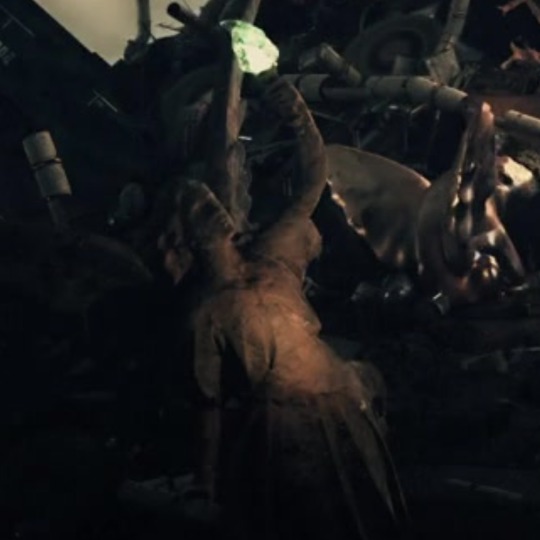

Speak of the devil: interestingly, there are two copies of an anonymous variation of the Angel of Light statue appearing twice on both sides of the bridge. Both the title as well as the statue itself seem like obvious references to one (former) angel literally called the Lightbringer, Lucifer. Perhaps one of them is representing his son, the Antichrist, instead, with the both of them helping out the Ineffables on two opposing — or perhaps only parallel — sides of the bridge?
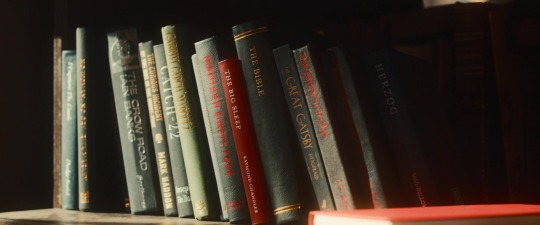
The light carried by Lucifer appears to be green, a color used in the series as a visual representation of Hell, but on the intertextual level might also serve as a reference to F. Scott Fitzgerald’s classic novel The Great Gatsby and the green light at the end of the Daisy’s dock symbolizing the undying love, desperation, and longing for an unattainable dream. In the story, the color represents the limitations of power and money. Not surprisingly, the novel appears on Jim’s bookshelf and is part of the Good Omens book club — a list of personal recommendations from Neil Gaiman and Douglas Mackinnon for the fans to catch up on before the next series.
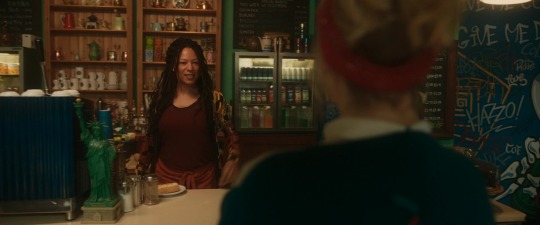
Last but not least, the possible connection to Libertas as the inspiration for the Statue of Liberty, shown multiple times in S2 as a foreshadowing of our character’s trip to America in S3. The related quote of Patrick Henry “Give me liberty or give me death” becomes even more relevant if we consider how the motto of the French Revolution was sometimes written as Liberté, égalité, fraternité ou la mort (“Liberty, equality, fraternity or death”). A lesson surely learnt by a certain angel back in 1793, when he was held prisoner for the last time before being forcefully taken Upstairs in the Final Fifteen.
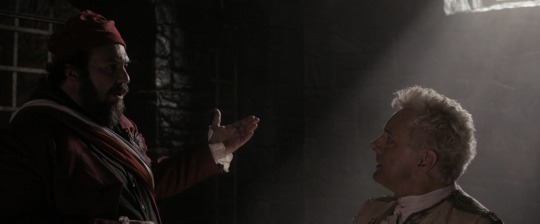
The bridge and the castle
Okay, these are the basic observations. Now a brief historical overview and we will reach the fun bit in a jiffy.
Have you ever wondered about the meaning of this whole complex? It wasn’t always angelic, but named after a Roman noble dynasty. The Aelian bridge was built by the Emperor Hadrian in 134 AD to span River Tiber from the city center to his mausoleum. With time, the remains of more emperors were put to rest in there, until it was plundered and destroyed in a war. Then the remaining structure was transformed into a military fortress and a castle serving as the papal residence in times of war.
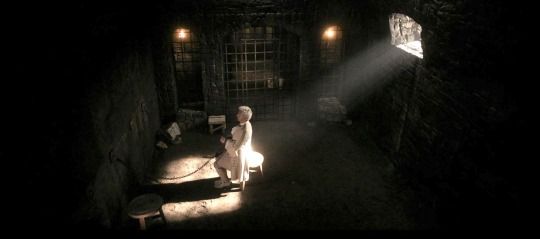
The Papal State also used Sant'Angelo as a prison; the Renaissance philosopher Giordano Bruno was imprisoned there for six years. Executions of the inmates were performed in the small inner courtyard, but they weren’t the only deaths in the area. On the other side of the bridge, in the adjoining Piazza del Ponte, under the watchful eyes of the stone likenesses of two saints, the public executions were held, and the heads of the criminals were brought onto the bridge and exposed to public view there.
As a prison, the former mausoleum is also the setting for the third act of Giacomo Puccini's 1900 opera Tosca. Long story short, the eponymous heroine convinces her lover to feign death so that they can flee together. Unfortunately, they are betrayed and the firing squad shoots at him with real bullets instead of blanks. Tosca believes in the quality of his acting performance rather than the truth, and when the realization hits her, she leaps to her death from the Castel’s ramparts.
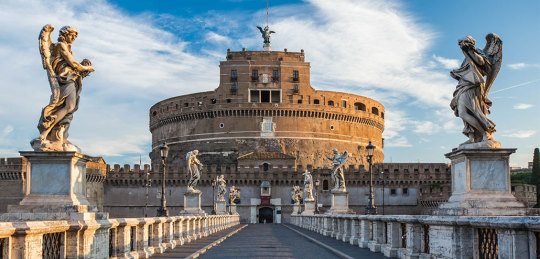
After Nero’s bridge was destroyed, the travelers were forced to cross this bridge as the only direct route to the Vatican and St Peter’s Basilica, earning it the nickname “the bridge of Saint Peter”. That’s why in the 16th century Pope Clement VII erected statues of Saints Peter and Paul at the ends of the bridge, guarding it as they are supposed to protect the entry to Heaven.
In 1688 the bridge was embellished with ten angel statues, five on each side of the bridge, carrying Arma Christi, the Instruments of the Passion. The Good Omens characters represented by those statues in the opening sequence might be other instruments of Christ’s suffering as parts of the system that needs to be overthrown or replaced.
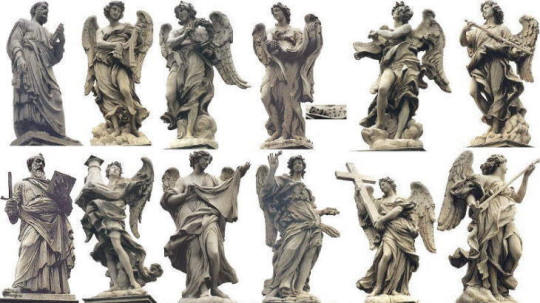
One angel appears particularly important in the context of both the bridge and the Second Coming — Saint Michael the Archangel.
Legend holds that the Archangel Michael appeared atop Hadrian’s mausoleum, sheathing their sword as a sign of the end of the plague of 590, thus lending the castle its present name. A less charitable yet more apt elaboration of the legend, given the militant disposition of this particular Archangel, was heard by the 15th-century traveler who saw an angel statue on the castle roof. He recounts that during a prolonged season of the plague, Pope Gregory I heard that the populace, even Christians, had begun revering a pagan idol at the church of Santa Agata in Suburra. A vision urged the Pope to lead a procession to the church. Upon arriving, the idol miraculously fell apart with a clap of thunder. Returning to St Peter's by the Aelian Bridge, the Pope had another vision of an angel atop the castle, wiping the blood from his sword on his mantle, and then sheathing it. While the Pope interpreted this as a sign that God was appeased, this did not prevent Gregory from destroying more sites of pagan worship in Rome. In honor of the vision and Michael, the bridge was renamed in their name.
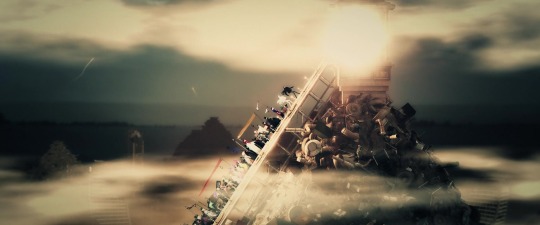
What if the procession from the opening sequence was meant to imitate the procession led by the Pope from the legend? What if Aziraphale, now officially a Supreme Archangel, Commander of the Heavenly Host, is the one actually leading it, with Crowley finally at his side as his partner and second in command, just like it was proposed by him in the Final Fifteen?*
What if by some reason, maybe personal ambition, maybe just a tragic coincidence or situational necessity, there really was an impostor in Heaven, and Metatron — the so called Voice of God who seemingly doesn’t speak up for Herself since Job’s test — has been playing a winged version of the Wizard of Oz all along?
It would make just the perfect sense if not for one tiny detail. The procession we see on the bridge is actually led by Crowley, which doesn’t fit the parallel at all — unless it’s actually a proof of an ongoing body swap, as the mismatched names of the actors could also suggest?
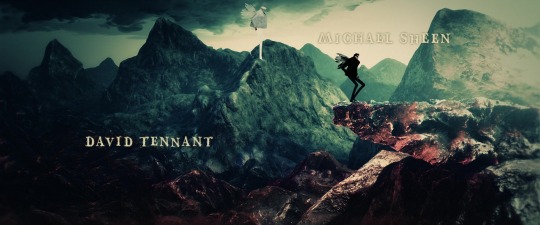
The mountain of trash and the bookshop
The symbolic mountain of trash we can see Aziraphale and Crowley climb is a reference in itself. To an actual mount called Zion, believed to be the place where Yahweh, the God of Israel, dwells (Isaiah 8:18; Psalm 74:2), the place where God is king (Isaiah 24:23) and where God has installed king David on his throne (Psalm 2:6).
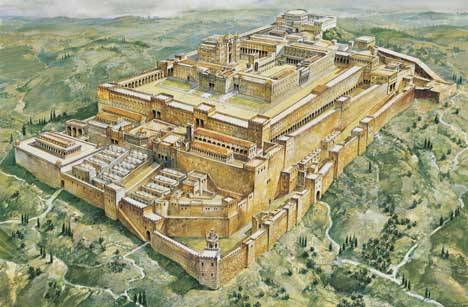
In a literal sense, it’s a hill in Jerusalem, although the sources refer to three different locations in different contexts — although for the purpose of this meta the Upper Eastern Hill (Temple Mount) makes the most sense. Its highest part became the site of Solomon's Temple. The same King Solomon the rituals in Freemasonry refer to. Masonic buildings, where lodges and their members meet, are sometimes called "temples" specifically as an allegoric reference to King Solomon's Temple, not actual places of worship. And Aziraphale’s bookshop is built around Solomon’s Magic Circle.
In a metaphysical sense, and especially in the context of the Christian New Testament, it is also believed to be a part of Heaven — the heavenly Jerusalem, God's Holy, eternal city. Christians are said to have “(…) come to Mount Zion and to the city of the living God, the heavenly Jerusalem, to an innumerable company of angels, to the general assembly and church of the firstborn who are registered in heaven” (Hebrews 12:22-23 cf. Revelation 14:1). Just like the procession were following in the opening sequence.

There’s been some speculation whether the lift on top of the mountain could symbolize Aziraphale’s bookshop, or, more specifically, the oculus in its centre. If you look closely at the enhanced screenshot, you can see that the dome isn’t made of glass and that it looks like a tower (a church’s bell tower, perhaps) more than a whole building.
And there is an actual doorway in there — not like the modern lift doors — opening up towards the source of that white, heavenly light. And what kind of enlightenment can you usually find up in the skies or heavens?

We’re welcomed to crack open the doors to the Heavenly Sanctuary — the Most Holy place, Sanctum Sanctorum, the Holy of Holies — to undraw the final curtain and finally stand eye to eye with God. Who knows, maybe even ask some questions or listen to some answers.
Or, at the very least, to meet one of Her forms known as Jesus Christ. Because that’s precisely where he serves as our (humanity’s) Mediator and the Holy Priest after his Ascension to Heaven. The structure at the top reminds of some temple architecture seen in Antiquity and Christianity.
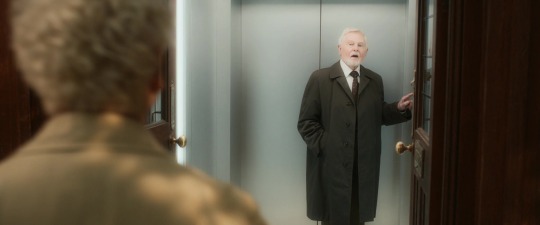
The Catholic Church considers the Church tabernacle or its location (traditionally at the rear of the sanctuary) as the symbolic equivalent of the Holy of Holies, due to the storage of consecrated hosts in that vessel and their meaning as the Body of Christ. Tabernacle is commonly marked with a red light turned on and off depending on His presence or lack if it.
Looks like He’s already in the area, one way or another, keeping eye on some things.
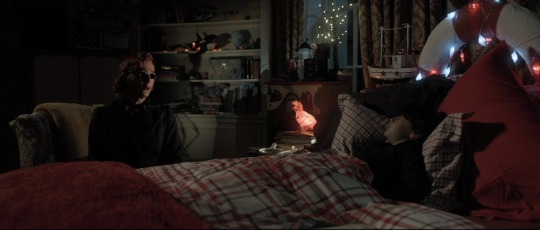
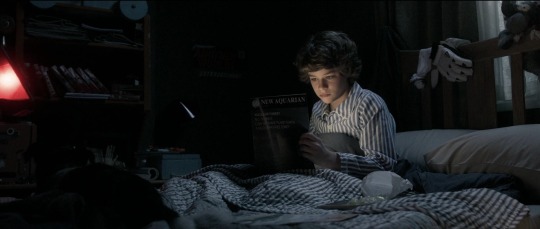
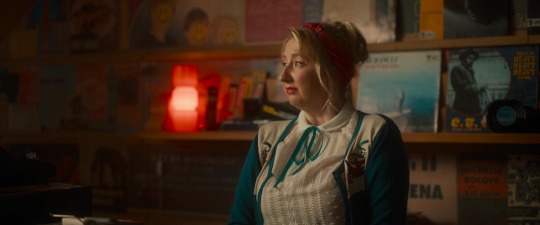
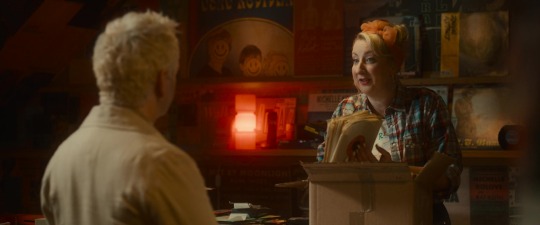
Are we following a procession of believers happy to embrace their one and true Savior? Or are they actually protesters on their way to dethrone the authority and the system?
Guess we will have to wait and see.
#the good omens crew is unhinged#everything has a meaning#title sequence#angels everywhere#archangel fucking gabriel#gabriel’s statue#bookshop statues#statues update#ponte sant’angelo#let there be light#good omens analysis#good omens meta#bible fanfiction#yuri is doing her thing
128 notes
·
View notes
Note
There's this weird thing going on Reddit right now where people are claiming that legally, Rhaenyra children are not bastards. And I was wondering if you agree or disagree. I think that people are just making up their own canon lore at this point.
Hi anon,
I think what gets kind of muddled in this discussion is what "legally" means in the context. Generally speaking, children born within wedlock are considered legitimate until proven otherwise. Now in the medieval world, it's not like you were issued a birth certificate that you could whip out and say see, it says right here who the father is! There were no DNA tests, it was all a matter of word, and by and large a woman's virtue was her word, and it was what kept her and her children protected within the framework of medieval marriage. But the reason why bastardy matters in this context is also important. It's not like Rhaenyra is trying to collect child support here, nor is she a common merchant's wife whose husband has decided just to roll with it. She's the heir to the throne and the parentage of her children is a matter of inheritance and dynastic succession, so it's not a situation where a legal loophole is particularly helpful as a gotcha. There is not at this point in history a comprehensive codified law that clearly defines what these terms mean and defines the rights and obligations of parents and children legitimate and illegitimate, mostly you have combinations of precedent, tradition, oath, and a healthy dose of might makes right.
(I saw another reply to this question in which the responded basically goes, "free yourself from the shackles of this construct! Marriage isn't real it's an oppressive institution and the idea of bastardy is made up, so let it go," and while it's true that marriage, legitimacy, etc. are all social constructs and not absolute states of being, they started off as having a functional purpose within a certain social framework. And this is a basic problem a lot of people have with George's world, it's not that we have to have the views of a 12th century French peasant, or that everything has to be historically accurate, but George chose the medieval world as a setting for a reason, and it's not just an aesthetic one. Characters in even a quasi-historical setting have to act within the constraints of that setting. We have to understand that people don't know what they don't know. The medieval world doesn't have any framework for the introduction of feminist ideals. Westeros hasn't even had a Christine de Pizan yet. You couldn't walk up to a medieval peasant woman and say "marriage is a tool of patriarchal oppression and bastardy is a social construct," they'd look at you like you had two heads. And so we have to acknowledge that you can't simply start dismantling existing social structures if the framework doesn't exist to replace them with something better that offers more protections for a broader group of people, and at this point it definitely doesn't. Making an exception for one very privileged woman does not mean progress for all women, instead it often means destabilization of the flawed system that does exist, and even more violence against those less powerful in order to enforce the exceptional status).
So from a medieval point of view, marriage was pretty much a non-negotiable for a woman. And women weren't simply getting married because they were pressured into it by their families or because their fathers were opportunistic assholes, they got married because unmarried women had no legal status or standing. In most places they could not sign contracts or own land. A woman could join the church or get married (or become a prostitute, but it's not like sex workers had freedoms or protections either). Divorce wasn't a thing, and annulment was hard to get and usually available only as a tool for men to set aside their wives. So, for all intents and purposes, once you were married, that was generally it, you were stuck for life (the upside is that widows did get a lot more freedom, so marrying an older guy and waiting it out was not a bad option sometimes, all things considered). But what marriage did provide was assurance that you and your children would be protected and provided for. Marriage was a practical agreement, involving dowries, inheritances, and alliances sealed in blood. And this is one of the reasons why bastards could not inherit. Inheritance for once's children was one of the few perks of a marriage for a woman (this is, incidentally, why Alicent is so pressed about her children being effectively disinherited. There is NO reason for her, as an eligible maiden of good standing, to marry a man who will not provide for her sons, king or not). And of course, a man's bastards are obvious and are disqualified from inheriting (setting aside legitimization because it is not nearly the easy out that people think it is). You can't really pass them off as legitimate because your wife clearly knows which children she gave birth to, whereas a man might be told he is the father of a child when that child's father is in fact someone else.
In a dynastic marriage, all of this becomes even more important. Marriages were made as alliances and to strengthen the ties between kingdoms or houses. A child seals the marriage agreement by binding two bloodlines and creating kinship bonds that will last beyond the current generation. Those kinship bonds can ensure peace between kingdoms at war, trade agreements, and military aid. Passing a bastard off as trueborn breaks that agreement; it violates the very principle by which the agreement was made. And in this context, it doesn't actually matter if the father claims the children as his, because in a dynastic marriage inheritance is not just a personal matter, it's a matter of the state. The truth matters to a great many people, more than just the immediate family. A lie doesn't become the truth simply because the liar isn't caught, and there's no statute of limitations or court ruling that will ever put the matter to rest for good. Passing off a bastard as trueborn destabilizes the succession and breaks the dynastic bonds that the marriage was meant to establish. When the bastard heir in question attempts to take the throne, it won't be a smooth transition.
So what does it mean that Laenor and Corlys agree to pass Rhaenyra's children off as trueborn? It means that their bastardy cannot be proven at the moment insofar as the legal father, Rhaenyra's husband, is playing along and covering for Rhaenyra, and Viserys is backing them up by giving this his "legal" stamp of approval. But again, our view that it's no one else's business but Laenor and Rhaenyra's and that Viserys "legalized" their status is very modern. Jaehaeyrs and Alysanne were not considered married in the eyes of the Westerosi until they'd had a bedding ceremony, that is, the consummation of their marriage was witnessed. Royal marriages and the children that come from them are a public matter because the succession affects everyone in the realm. Laenor, Corlys, and Viserys can protect those children in the short term, but Laenor and Corlys and Viserys won't live forever, and they could withdraw their support for those children and renounce them as bastards at any time. Harwin could admit to fathering them, Rhaenyra and Harwin could get caught in the act, or someone else close to them might confess. Sure right now the black faction are all one big happy family, but 20 years down the line when bastard Jace takes the throne over trueborn Aegon III? There are multiple people in the family who could confess to knowledge of the bastardy, including Aegon III himself. The bastardy is too obvious and there are too many legitimate heirs of both house Targaryen and house Velaryon getting pushed aside in favor of bastard born children for it to be an issue that simply disappears because Rhaenyra and Laenor say so.
So "legal bastardy" is a pretty meaningless concept when it comes to royal succession because it's not a matter that's going to be settled by some neutral third party in a court of law. What matters in the long run is not whether or not Laenor claimed the kids, what matters is whether or not the situation is questionable enough that people with the power to challenge it might challenge it. And we see even within the actual narrative of the Dance that this is indeed the case. There is already a situation brewing with the other branches of the Velaryon family who are rightfully pretty pissed to see their ancestral seat pass to someone with no blood ties to the family (and as an aside, people will say Vaemond was self-serving, and of course he was, but that doesn't make him wrong, and maybe Baela or Rhaena should have inherited instead, but neither they nor their father were pressing their claims because they were backing up the bastard claimants, so was Vaemond supposed to do that for them?). And yes the king and Rhaenyra can cry treason and they can kill Vaemond and cut out tongues, but using force to silence people for telling the objective truth is by definition tyranny, and that's exactly the sort of situation that would get the nobility nervous. Because if Rhaenyra has to silence people already and she's not even queen yet, what will Jace have to do when he takes the throne? That's the real problem, not the "legal" status of Jace and his brothers, but the practical ramifications of hiding the truth.
122 notes
·
View notes
Text
Malaria, Sickle-Cell, and Dragons in the Temeraire Universe
so I've been thinking about sickle cell all day because of the very cool real-life FDA crispr treatment approval news, and also I'm just about done rereading empire of ivory so thusly it is time to write the sickle cell/malaria/dragons/benefits of human-dragon mutualism breakdown I mentioned ages ago.
Standard disclaimer that I am not in fact anywhere near an expert on this, this is mostly recall from ANTH 102/215 classes I took five years ago, the info is very simplified and possibly somewhat out of date. I'm doing some quick checks and I write this but only enough to make this an appropriate fantasy novel fandom post, not enough to make it actually reliably informative. I do have a couple citations, but mostly for the parts I'm lifting straight out of a class assignment I wrote, and they're a short documentary hosted on YouTube and the textbook for the class. also none of my links are live because I want this fandom post to actually show up in the fandom tag lol.
second disclaimer is I'm starting at the basic obvious stuff because I genuinely have no idea how much most people know about this and better safe than confusing.
Intro and Background
So the first thing to know about any of this is that human genetics for the most part to not operate on mendelian inheritance. So the punnet squares in high school biology that did human hair or eye color as basic dominant/recessive one-gene traits were totally lying to you. Like they're a teaching tool for a very simple model that works well enough but they're not accurate. Most human phenotypes are way way more complicated genetically than that.
That said, there are exceptions. Mendelian traits (Characteristics that are influenced by alles at only one genetic locus) do exist in humans, a number of them being related to genetic diseases. The list in the ANTH 102 notes I just dug up was: Wet (dominant) or dry Earwax; Albinism; Brachydactyly (dominant); Blood type (ABO, not the positive/negative part); Hereditary breast-ovarian cancer syndrome (BRCA-1, BRCA-2, unknown genes); Huntington’s disease; Lactase persistence (dominant); and Sickle-cell disease (recessive).
So the sickle cell punnet square looks like this for two parents who both have one copy of the sickle cell gene:

Sickle cell is a very painful and life threatening disease, (That's why the FDA approving a crispr treatment for it allowing patients to be their own bone marrow donors is very exciting.) and from an evolutionary perspective, one that very often prevents people from reproducing. It's also not strictly dominant/recessive, in that people heterozygous for sickle cell can have some symptoms like the possibility a sickle-cell crisis triggered in low-oxygen situations (high altitudes, intense exercise, etc).
So one might think that Sickle cell would be a vanishingly rare disease, since having it can be deadly and even having the trait can in some cases cause problems. Only it's not rare by genetically inherited disease standards, not at all.
And to make a long story very short, the reason is malaria.
Malaria
People who are heterozygous (possessing one sickle cell gene and one normal gene) for sickle cell anemia are resistant to malaria. In areas of the world without a high incidence of malaria historically, there is a strong selection against the sickle cell gene, (Biointeractive Malaria and Sickle Cell Anemia, 9:33) but in areas with malaria, both having sickle cell disease (homozygous HbSS) and not having the trait at all (homozygous HbAA) are selected against. People with sickle cell were historically less likely to reproduce, and people who were not resistant to malaria were more likely to die of malaria and also not reproduce. Because being heterozygous with sickle cell is selected for, the gene persists in the population.
The implications of that are best summed up from this map that I just stole from Britannica.com:

I dunno if the percentages on that second one are accurate tbh, other infographic maps I'm looking at give different ranges. but sill, you get the gist about how common it is in equatorial Africa. In the modern United States Black children are much much more likely to be born with sickle cell than white children—the genes don't just go away when the threat of malaria is removed. (And yeah, that's a historical consequence of the slave trade.)
There's some other stuff wrapped up in here too about bio-cultural evolution: There's indications that malaria was not a “significant problem until humans abandoned food foraging for farming” (Haviland, W. A., Prins, H. E., Walrath, D., & McBride, B.). Humans cleared away the forest, which had kept the soil absorbent. Without the vegetation, more water built up on the surface, forming stagnant puddles which were a perfect environment for malaria-causing mosquitoes to thrive, thus creating the conditions for sickle cell anemia to be advantageous. Farming creates caloric surplus which is great for humans, but it also changes the environment in ways that can be detrimental. Malaria is one way, creating the conditions for other epidemic diseases to thrive is another, etc. etc.
But if you've read this far you're probably going "Chi, you promised this would be a fandom post but so far this has been a serious and kind of sad post about disease. when are you going to get to the dragons?"
The Dragons
So the first time malaria comes up in the Temeraire books is in Throne of Jade, when a bunch of the sailors on the Allegiance come down with "malarial Fevers."
Jane, I must ask you to forgive the long gap in this Letter, and the few hasty Words that are all by which I can amend the same now. I have not had Leisure to take up my pen these three weeks—since we passed out of Banka Strait we have been much afflicted by malarial Fevers. I have escaped sickness myself, and most of my men, for which Keynes opines we must be grateful to Temeraire, believing that the heat of his body in some wise dispels the Miasmas which cause the ague, and our close association thus affords some protection.
But we have been spared only to increase of Labor: Captain Riley has been confined to his bed since almost the very first, and Lord Purbeck falling ill, I have stood watch in turn with the ship’s third and fourth lieutenants, Franks and Beckett. Both are willing young men, and Franks does his best, but is by no means yet prepared for the Duty of overseeing so vast a Ship as the Allegiance, nor to maintain discipline among her Crew—stammers, I am sorry to say, which explains his seeming Rudeness at table, which I had earlier remarked upon.
I do not know enough about what people thought about malaria in the 19th century to be 100% sure that this is actually malaria, but I think Novik wouldn't want to confuse her readers by calling something malarial that isn't you know..malaria. So I'm going to assume thats what it is. Google is not giving me figures on malaria survival rates before modern medicines for it which is driving me kind of nuts and means I can't say how lucky Riley and Purbeck were to survive with apparently no complications, but that's not the point here anyway. The point is the comment about the aviators not getting sick.
And not only (mostly) not getting sick, but not getting sick even though they aren't actually always near Temeraire. Laurence for example has been working watch shifts near constantly because he's the only one left on the ship who knows what he's doing. That means probably less read & cuddle time than is normal for him and Temeraire, and yet—no malaria.
We modern readers (and Novik) know that malaria is not caused by "miasmas" but by parasites carried by mosquitos. And lo and behold when we get to Empire of Ivory we get:
Mosquitoes sang happily as dusk drew on, though they did not come very close to Temeraire; the flies were less judicious. The shapes of the trees were growing vague when Temeraire woke with a start and said, “Laurence, there is someone coming, there,” and the grass rustled on the opposite bank.
So yeah, the dragons are keeping the mosquitos away. I know fuck all about why—it's probably not heat since you know, mosquitos like warm blooded organisms, but maybe it's an oil or a chemical or some artifact of the way some of them can breathe fire that's present in all dragons or something, they're described as smelling weird a few times, so who knows. If it's a substance like an oil in their skin that could explain why the aviators don't get sick even when they're not nearby, since they could have some on them from contact, but that's just speculation. The point is not the mechanism, just that it's happening.
The Point
This whole post grew out of a throwaway comment I made about the benefits of mutualistic symbiosis with dragons from the human perspective in that one post about how the series has some interesting stuff obviously going on psychologically/biologically. The point of going in-depth on malaria and sickle cell is to show how this is really impressively solid worldbuilding in relation to the Tswana.
See, Empire of Ivory describes locations that seem like they're in modern day Botswana, Zimbabwe, and Zambia, regions which will have had long-term problems with malaria-causing mosquitos. That's not the densest area for sickle cell, but still definitely in the region where malaria would have exerted selective pressure.
Selective pressure which, in a universe where just being around a dragon is going to drastically reduce malaria rates, is going to leave dragon-friendly populations a lot healthier than dragon-unfriendly ones. A community that has a dragon stay every night and work alongside humans during the day is going to have a lot less malaria even without the sickle cell resistance than a community which has no dragon. And considering that malaria is bad enough that sickle cell genes persist despite it also having a high chance to cause a deadly disease, whereas a dragon that's a fully prosocial member of the community is not going to cause more death and instead will probably help with defense and create more caloric surplus (at the cost of consuming most of that surplus) a dragon is just obviously the better option. From there, it's extremely easy to see how the Tswana in the series could develop such a dragon-centric culture and have it be so wildly successful. The dragons provide fertilizer, the dragons allow for fully domesticated elephants, and the dragons render malaria—one of the deadliest diseases in history—nearly a nonissue. Of course they're family.
Citations:
Biointeractive. (2014, August 26). Malaria and Sickle Cell Anemia - HHMI BioInteractive Video. Retrieved October 3, 2018, from https://www.youtube.com/watch?v=Zsbhvl2nVNE
Haviland, W. A., Prins, H. E., Walrath, D., & McBride, B. (2017). Anthropology: The Human Challenge (15th ed.). Boston: Cengage Learning.
#Temeraire#it’s more bio-cultural evolution#wikipedia claims that malaria may have killed 50-60 billion people through history but I do not trust that citation AT ALL#regardless its still one of the deadliest killers ever#the kitten rambles#malaria#sickle cell anemia#Artemis if you read this I am sorry for the butchering I made of some anthropology concepts
95 notes
·
View notes
Text
Now I’m Covered In You [Chapter 4: Midnight]
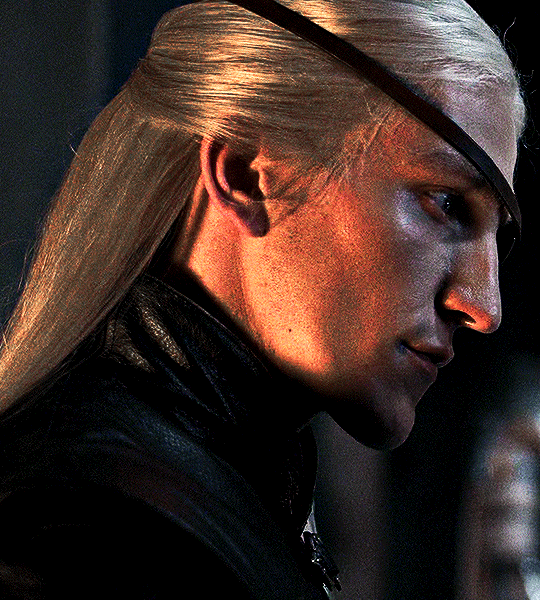
Series summary: Aemond is a prince of England. You are married to his brother. The Wars of the Roses are about to begin, and you have failed to fulfill your one crucial responsibility: to give the Greens a line of legitimate heirs. Will you survive the demands of your family back in Navarre, the schemes of the Duke of Hightower, the scandals of your dissolute husband, the growing animosity of Daemon Targaryen…and your own realization of a forbidden love?
Series title is a lyric from: Ivy by Taylor Swift.
Series warnings: Language, sexual content (18+), dubious consent, miscarriage, pregnancy, childbirth, violence, warfare, murder, alcoholism, sexism, infidelity, illness, death, only vaguely historically accurate, lots of horses!
Word count: 6.1k.
Link to chapter list (and all my writing): HERE.
Taglist: @borikenlove @myspotofcraziness @ipostwhatifeel @teenagecriminalmastermind @quartzs-posts @tclegane @poohxlove @narwhal-swimmingintheocean @chainsawsangel @itsabby15 @serrhaewin @padfooteyes @arcielee @travelingmypassion @what-is-originality @burningcoffeetimetravel @blackdreamspeaks @anditsmywholeheart @aemcndtargaryen @jvpit3rs @sarcastic-halfling-princess @flowerpotmage @ladylannisterxo @thelittleswanao3 @elsolario @tinykryptonitewerewolf @girlwith-thepearlearring @minttea07 @trifoliumviridi @deltamoon666 @mariahossain @darkenchantress @doingfondue
Let me know if you’d like to be added! 💜
It paints you like a canvas: sunlight, candlelight, sunlight again.
Two days after the miscarriage—the stillbirth, actually, the delivery, the beginning and the end all at once—you are searching the halls of Westminster Palace, the train of your gown dragging on the floor. It’s just a little too long for you now; it had been tailored to accommodate the additional weight and inches of pregnancy. And the court is just like they were before. They gawk, they jabber amongst themselves, but they can’t seem to think of a single word to say to you. Well…there is one exception.
“Sweet Jesus, what are you doing here?!” Nico exclaims when she rounds a corner and spots you. She rushes over and takes both of your hands in her own. “You look awful, you must be ready to drop over and sleep wherever you fall. Come on, I’ll walk you back to your rooms—”
“I can’t stay in bed for another second. I’m losing my mind. I’m just lying there, useless, staring up at the ceiling thinking about...everything.” The baby. The throne. Aegon. Aemond.
“Oh,” she says, sympathetic and yet proud. She sweeps back loose strands of hair from your face. “You have too much fire in you for that, I suppose. I shouldn’t be surprised. It’s a shame you were born a woman, you could have ridden into battle and butchered people and put all that ruthlessness to good use.”
“Being a woman didn’t stop Boudicca.” And she wasn’t just a woman. She was a wife, a mother.
“And where did that get her?” Nico retorts with raised eyebrows. “Nowhere enviable.”
You can’t think of a clever response. “Would you happen to know where Aemond is?”
“Not presently. He’s been looking in on you, you know.”
You do know: you’ve glimpsed him in the doorway, caught his whispers with the physicians and the midwives and your secretless English ladies. “I need to speak with him about something. To…” You pause. You can’t tell Nico about the poem that’s now hidden in the trunk at the foot of your bed; but you can tell her something else that’s true. “To thank him.”
“He’s been distraught,” Nico says, her voice low. “Quiet, secluded. Even more than before.”
As usual, she sees too much. “Yes.”
“He cares for you. Quite a lot, I think.”
“I’ll check the courtyard,” you say, hoping to change the subject. “Maybe he’s training there.”
“Do you want me to go with you?”
“No, I think I can manage.”
“What if you pass out and end up out in a field somewhere covered with snow? What if you find a boat and row yourself back to Navarre? What if you’re eaten by wolves?”
“Send out a search party if I’m not back in an hour. But don’t invite Daemon. He’d drag me headfirst into the lair.”
“Alright,” Nico relents, touching your hair fondly again. “One hour. And I’ll chew my nails to bits the whole time.”
“As long as they’ve grown back by the wedding.”
She beams, white teeth and starry eyes. When she at last marries Daeron in August she will be another princess from the Continent, another thread in the Greens’ tapestry. She will be a lot like you…except that she will be in love with her husband. And she will be able to give him children.
But Aemond’s will come before them in the line of succession, you think, with a mournfulness that shocks you. The sons he has with whoever he ends up marrying, Helene of Austria or Beatrice of Naples or Anne of Bohemia. Some other woman, some other future, parts of him I’ll never know.
“I want you to help me choose every detail,” Nico says. “From the food to the fashion.” This is how she plans to distract you from your own misery. And the Duke of Hightower will indulge her: with every pregnancy you lose Nico becomes more relevant, and in any case Milan is a greater ally than Navarre. If the Holy Roman Emperor’s daughter ends up crossing the English Channel, she will eclipse you both.
“I’ll endeavor to not be eaten by wolves until August,” you tell Nico, and then head outside into the courtyard.
Aemond isn’t sparring there with Sir Criston Cole; with the exception of a few amorous couples strolling through the powdery white snow, the courtyard is empty. You pass next through the palace gardens, frozen and naked, their treasures—angelica, feverfew, St. John’s wort, betony, chamomile, rosemary, pennyroyal—long-since plucked and dried and stored away for winter. Aemond isn’t there either, and he isn’t in the royal stables when you enter them, horses chomping noisily on oats and hay.
You go to Vhagar’s stall and she pops her great shaggy head out to greet you. “Hello, you big monster,” you murmur, smiling. You run your palm down the white stripe of her blaze. She’s killed people, and everyone knows those stories; she stomped one man to death and kicked another in the jaw, trotting away and leaving him to drown in his own blood. That was before Aemond tamed her when he was still a boy. He mellowed her, or she mellowed for him, and however it happened they’re both better off for it. She’s a weapon, the same as his sword or his strategies. She has a role to play in the Greens’ battle for the throne as well.
There’s rustling from Sunfyre’s stall, too loud to be a rat or a bird. You cross the aisle and peer inside. There on the floor, half-covered in straw, is sprawled your husband. Sunfyre looks passively down at him, stems of hay sticking out like porcupine quills from his muzzle.
“Aegon?!”
“Shh!” he pleads, waving one hand drunkenly. His white-blond hair falls over his face like a veil. “I’m hiding.”
“From who?” But the answer to this is obvious; you know before he says it.
“Grandsire. He’s furious, he’s a demon. He’ll have me drawn and quartered.”
“What’s he so upset about?”
“Oh, the same old thing, I’d imagine,” Aegon says vaguely. His shortcomings, his embarrassments. Then his murky ocean-blue eyes focus a bit and his voice goes tender. “Are you in pain?”
“I’ve had a lot of wine. It helps some.” Takes the edge off, smooths down the fangs, dulls the knowledge that parts of you are still collapsing down to fill the space where your child once lived. Blood drains away, blood fills up again, blood readies itself for the inevitable next attempt.
“Good,” he says, though uncertainly. His sentiment is clear, but he doesn’t know how to express it.
“Have you seen Aemond?”
“Not today.”
You sigh. “Never mind, then. I’ll keep looking.”
“Should you be running around the palace like this?”
“I haven’t done any running in a very long time. And I’m confident I can find my way back to bed when I need to.”
Now Aegon is gazing up at the stable ceiling, studying eaves and bird nests like constellations. “It should have been him,” he exhales like a confession.
“What?”
“Aemond. It should have been him. The one to shoulder the responsibility, to reign. I don’t belong someplace where people watch me. I have nothing to show them that they want to see. I belong someplace warm and wild, someplace I can disappear. Is it such a crime to not want to be held to a higher standard than an inconsequential man? Is it such a crime to not wish to be remembered? I never asked to be the heir. Not even the king wants me to be the heir. How am I the one in the wrong here?”
“I think many of us wish for things we cannot have,” you reply morosely.
“We could have them,” Aegon counters. “If we ran far enough.”
“That’s a coward’s way out.”
“I’d rather be a free coward than a jailed prince. Or a dead one.”
As if to emphasize his point, you spy something odd about his saddle, hanging from a massive iron hook on the stable wall. You move closer to scrutinize it. Then you return to Sunfyre’s stall. “Someone cut your stirrup,” you say, frightened. “Before the Christmas boar hunt. It’s sliced clean most of the way through and then the rest of it must have ripped as you were riding.”
Aegon squints up at you. He’s mystified. “Why would someone do that?”
Your exasperation—your contempt, not for him but for his failings—must show on your face.
“Please don’t look at me that way,” Aegon says. “Not you. Mother always loved Aemond more, Father always loved Rhaenyra, Grandsire loved the throne. You are the only thing I’ve ever had that’s supposed to be mine.”
And now you’re the one who is imagining a traitor’s death: hanged momentarily, cut down and thrown onto a table, drawn open like a gutted animal as the crowd’s screams mingle with your own, dissected into quarters once your belly is sufficiently emptied. Because surely you’re the worst sort of traitor there is. “You must be more careful,” you implore Aegon. And he smiles; he takes this as a token of affection.
You finally find Aemond somewhere you should have suspected. It’s where people go to find peace, solitude, wisdom. He’s sitting in a cascade of kaleidoscopic light pouring in from the stained glass windows, scenes of King Arthur and Saint George, lovers and swords and dragons. You slide into the pew, cool austere wood. The small private chapel is abandoned except for the two of you. On the altar is a cross: blood, pain, sacrifice, redemption. Aemond has his hands folded and propped on the back of the next pew. He stares straight ahead, grim and silent. He must know you’re there, but he doesn’t make any sign that he does.
“I don’t mean to interrupt,” you say.
“You’re not interrupting. I was just speaking to God, but I’m finished now.”
“Do you believe he can hear us?”
“I used to.” Still, he keeps his eye on the altar. Flecks of luminance pepper his skin: gold, ruby, emerald, sapphire. “You’re wearing green,” he marvels. He can see you well enough for that, a blur on his periphery.
“Yes. Like ivy.”
And only now does he look at you, afraid and yet with fragile hope.
“Aemond,” you say softly. “I didn’t know.” I longed for it, but I didn’t know.
Long seconds tick by, ten, twenty, a hundred. “I have envied Aegon my entire life,” he says at last. “I have felt that I was more suited to be the firstborn, to be the heir. I have watched him squander opportunities and defile morality and bring nothing but heartbreak to my mother. I have worked myself to the bone to prove myself worthy of what he was freely given. I carry scars in the shape of his absence. I have always envied Aegon. But never more than the day I watched him marry you.”
You move without thinking, reaching for his hands and interlacing them with your own. “Please don’t hide from me anymore. I can’t endure it. Not added to the weight of everything else.”
He feels your cheeks and forehead, his brow crinkled with hushed concern. “You’re in pain.”
“I was alright when I left my bedchamber. Now…” Now the cramping is very bad again, and the strip of thick linen folded between your legs is nearly soaked through with blood, and your mood is sinking; you feel shaky and insurmountably sad, like you could rupture into tears at any moment.
He is distressed. “Why did you exert yourself like this?”
“I had to find you.”
He stands and offers you his arm. “Then now that you have, allow me to escort you back to bed.”
“And you’ll stay for a while?”
He smiles, warm, a flicker of candlelight in a dark room. “I’ll stay for as long as you’ll let me.”
You walk very slowly together, you clutching his forearm, Aemond distracting you with English legends: myths, monsters, men. But he does not speak of children. Westminster Palace is frenzied when you step inside, courtiers rushing around and hissing gossip back and forth to each other. Greens and Blacks appear to be equally scandalized; you wonder what has happened. As you and Aemond make your way down a hallway—your steps halting and dizzy—Prince Daemon sails by wearing a cruel smirk, sharp, delighted, Scottish deerhounds loping alongside him. And then you peek into the Great Hall and you see them: the Montfords, Lady Joanna’s parents and uncles and her handsome, ambitious brothers. They’re all beaming and radiant, though they really have no reason to be, now that Aegon is long past bedding Joanna and the Montfords can no longer call upon the Duke of Hightower for any exceptional favors. Come to think of it, you haven’t seen Joanna since around the time Nico arrived in London, since August, since you discovered you were pregnant again. That was five months ago. The Montfords are passing around an infant swaddled in green cloth, showing him off to the other powerful families of Southern England, accepting compliments and proposals of betrothal to wealthy newborn daughters. From what you can tell, the child is fat and mewing and…and…
You gasp, and Aemond swiftly directs you farther down the hallway before anyone notices you watching. He says nothing, but you can read the shock and fury on his face. Because Lady Joanna Montford’s infant is a healthy living boy with silvery white hair just like Aegon’s. Because her child is a Targaryen.
There are yelps and whimpers coming from Aegon’s bedchamber. Somebody must have found him hiding in the stables after all. The door is open. Inside the Duke of Hightower has backed Aegon into a corner and is slapping him: his head, his face, his hands when he tries to shield himself. Aegon’s pale skin is freckled with angry pink welts, his hair in disarray. There are still bits of straw knotted in it.
The Duke of Hightower seethes: “To do this, to have a bastard before you’ve secured the succession! It’s a disgrace! You have muddied the waters yet again, you have undermined certainty when we so desperately need it, when all of our lives depend on it! You should be putting every last ounce of the miniscule effort that you possess into producing a legitimate son with your wife—!”
“Grandsire, she’s not capable of it!”
Then they see you, and Aegon has the decency to cover his face in shame; but the Duke just glares at you, as if he wouldn’t mind hitting you too, as if you are dangerously close to becoming an enemy.
~~~~~~~~~~
Two weeks after the miscarriage, the royal family has gathered for a private dinner. The occasion is Daeron’s sixteenth birthday, although the king mentioned it once and then seems to have promptly forgotten again. He is admiring a collection of tiny woodcarvings of horses that Joffrey has made, praising them as if they are great treasures, handmade tapestries or poems or blades. Alicent, much to the contrary, fawns over her youngest son. She frets with his curly white-blond hair—trying to make it lie neatly, a pointless aspiration—and asks Nico about wedding plans. Nico is effervescent, bubbling over with enthusiasm for fabrics, colors, cakes, flowers.
Aegon sits to your right, Aemond to your left. Your husband is drowning himself in wine and peering blearily down at the trappings of the table: duck, mushroom pasties, spinach tarts, salmon pie, bread, and makerouns of course, Daeron’s favorite. Aemond doesn’t say much, but he ensures that your cup stays full of apple cider and your plate piled high with winter delicacies.
“I can’t,” you complain when he serves you another spinach tart. You’re still bleeding, although it has lessened considerably. You still have very little appetite. Weight has fallen off you like leaves from autumn trees since you lost the baby, a fact that no one seems to have noticed except Aemond.
“Try,” he replies, and slices you a portion of duck too, the browned skin crackling and shiny with grease. Across the table, Daemon and Rhaenyra exchange fleeting caresses and gazes warm with desire. Jace chats politely with Baela, Luke giggles with Rhaena. They all wear lustrous black like a uniform. Even the king wears it, accented with maroon the shade of dried blood.
“We must get you a real horse,” King Viserys is telling Joffrey, who smiles adoringly up at him. The king coughs into his sleeve and then continues. “Would you like a Marwari, like your mother has? They’re nimble, gorgeous creatures, and with such peculiar ears! They’re very rare as well, only bred in North India. Seafaring traders can bring some here for you to choose from. They come at a great cost, but you are worth it, don’t you agree, Joffrey? You know, India was once partially conquered by Alexander the Great. He…”
Aemond glances longingly at the king; it’s a split second, and then it’s gone. You are well aware that Aemond knows very nearly everything about Alexander the Great. The king never speaks to him about it. He rarely speaks to Aemond at all.
You lay a hand on top of Aemond’s. “Will you tell me about it later?” you ask him. “Alexander and India?”
He smiles, his cheeks blushing pink. “Of course.”
The Duke of Hightower clears his throat loudly. “I have some happy news to share.”
King Viserys looks up, as if suddenly remembering that the Greens are here too. “Oh? Do enlighten us, Otto.”
“After much negotiation, the Holy Roman Emperor has formally agreed to a match between his daughter and Prince Aemond.”
“Very impressive, Otto!” The king claps politely. He’s already resuming his conversation with Joffrey, a six-year-old.
“Wonderful!” Nico heralds cheerfully. “Lose a Helaena, gain a Helene!” She holds her cup aloft in a toast, then lowers it as she observes the awkward atmosphere of the table. You and Aemond are so determined not to appear heartsick that you can only avert your eyes, Alicent frowns anxiously, Daeron is bewildered, Aegon drinks. Rhaenyra forces a stiff smile; Daemon watches you, deep-set eyes gleaming with dark mirth.
“Well…” the Duke says. “Perhaps I should have started with the unhappy news. Princess Helene is dead of fever, God rest her soul.”
“Oh, the poor girl!” Alicent laments, crossing herself. “And poor Frederick and Eleanor.”
“Fortunately, Frederick still has one daughter left—only one—and he is willing to send her to us.” The Duke doesn’t have to say what this means aloud: that the Greens have risen ever-higher in the Continent’s estimation, that their allies grow mightier and more numerous by the day.
“How fortunate,” Daemon quips. “Always a wise idea to have children to spare.” He winks at you, swigs his wine, licks red drops from his lips. His Scottish deerhounds, which follow him everywhere, sniff around the table for scraps. “And who is the lucky bride-to-be?”
The Duke of Hightower is glowing. “Kunigunde.”
“Kunigunde?!” Aegon blurts out, then drops his head back down when the Duke glowers fearsomely at him. “Jesus Christ,” he mutters, staring into his wine cup. “What the hell kind of a name is Kunigunde?”
“She sounds…” Daemon raises his white eyebrows, choking back laughter. The Black children are following his example and snickering derisively, even little Joffrey, who doesn’t have the slightest idea what this marriage represents. Even the king smiles. “Germanic.”
“You’ll like her,” the Duke informs Aemond, ignoring his detractors. “You should be crawling on your knees to thank me for this match. You think I’ve taken no notice of your hard work, of your sacrifices, but I have. Kunigunde has received an extraordinary education for a woman. She studies astronomy and mathematics and history, not just languages. She practices archery. She is a renowned horsewoman and hunts often. She is intelligent, and she is bold, and she is precisely the sort of woman you would choose for yourself, is she not?”
“She is,” Aemond admits gravely.
“Kunigunde,” Aegon mumbles again, incredulous.
The Duke continues: “And so when she arrives you will wed her and bed her and I will hear not a single word of complaint about it. You will like her, or you will grow to like her, or you will endure it with grace if by some miracle you don’t like her. Is that understood?”
“How romantic,” Daemon chuckles. “A toast? To love?” He lifts his wine. Only the other Blacks join him, their cups clanging merrily against each other.
“I’ll be delighted to make a new friend, at least,” Nico says. “And one from so distant and vast a kingdom!”
Alicent nods distractedly. “Yes, we’ll have to ask her all about what it’s like there.”
“Hmm.” Daemon bites into a halved pomegranate, spilling juice like rubies, like blood. “Now my curiosity is aroused. Tell me, Navarre, what is your homeland like this time of year?”
“That depends on which region you have in mind,” you say frostily. Aemond is glaring at his uncle, measuring him, waiting, coiled. “The mountains are cold and snowy, the valleys are more temperate, the deserts are stark but still golden. Navarre is beautiful, even in January. It might be the most beautiful place there is.”
“You don’t find it to be…rather…” Daemon grins, pieces of pomegranate seeds caught between his teeth like bits of organs. “Barren?”
The table goes silent. Time slows until it stops. You should have a barb of an insult to hurl back at Daemon; you open your mouth to loose it like an arrow. But nothing comes out. Instead, hot sudden tears brim in your eyes and begin to spill down your face, your skull filled with flashes like white lightning: What would we have named him? What would he have been like?
Aemond bolts from his seat and goes for Daemon, fists swinging. Everyone is yelling; chairs are tipping over as people leap to their feet. Nico is shrieking and swearing at Daemon as her betrothed holds her back, his hands linked around her waist. Aemond’s knuckles crack across Daemon’s face as guards flood into the room and struggle in vain to separate them; Daemon strikes out, scratches, bites, yowls like an animal. Rhaenyra is pulling Rhaena and Joffrey away to safety. Unprovoked, Aegon pitches a handful of salmon pie at Baela, then screams and flees when she scrambles over the tabletop in pursuit. Alicent intercepts her, pinning Baela’s hands to her chest where they pose no threat. Jace and Luke try to join Daemon, but the Duke shoves them aside, bellowing ferociously, words you are too panicked to register. In the melee, Daemon snatches up a fork, turns to Aemond, and aims for his remaining eye. You dart beneath the table and knock Daemon off his feet, catching him unprepared. He whirls to you with his back against the floor, eyes glittering savagely, and, roaring, stabs at you with the fork. You duck, but the metal skates across your cheekbone, drawing a thin stripe of blood. The Scottish deerhounds are snarling and snapping at you. Aemond yanks you away and drags you to the other side of the room as Daemon follows, reaching for the hilt of his sword.
“Enough!” King Viserys thunders, and the turmoil dies. Alicent flies to him—attempting to pacify—but he ignores her.
“He must pay!” Aemond shouts, pointing at Daemon, whose nose is bloodied from his blows. “He must pay for what he’s said, for what he’s done!”
“It looks to me that he already has,” the king replies impatiently. He grimaces at everyone present, with no lines drawn between the blameworthy and the not. “This rivalry, this petulance, this bitterness, it must end!” He turns to the Duke of Hightower. “You must restrain your branch of the family, Otto, just as Rhaenyra must gain better control of hers—”
“Viserys, Daemon has ceaselessly antagonized the princess—!”
“I am not Viserys!” the king booms, then pauses to cough. “I am the king, I am your king, and since there seems to be enduring confusion, allow me to clarify some things, some exceedingly fundamental things. I have already chosen an heir, and it is Rhaenyra.” He looks to Daemon. “You have nothing to fear from Alicent’s children. You have no cause to provoke them. It is a waste of your many talents.” Now the king addresses Otto. “You can glorify your house however you see fit, but remember where this all ends. Rhaenyra and her heirs will inherit the throne upon my death. It stays with her, that is my most ardent wish. It is treason to undermine it. By all means, increase the wealth and status of your dukedom. But never forget who gave it to you.”
The king sweeps out of the room, Rhaenyra and her children following closely behind him. Alicent stands there helplessly, abandoned, forgotten. Nico and Daeron comfort her instead. Aegon meanders back to the table, sighs deeply, and pours himself a fresh cup of wine. Aemond examines the shallow gash across your cheek. Daemon watches, a dozen guards stationed between you and him. Growling Scottish deerhounds flank him like the train of a gown.
“I’ll kill you one day,” Aemond says calmly, matter-of-factly.
Daemon shrugs. “You’re welcome to try.”
And then he’s gone.
~~~~~~~~~~
Two months after the miscarriage, the physicians say it’s time to try again. They are the ones who decide: not you, not Aegon, not either of the people whose bodies are requisite to the task. Just old men in the service of another old man: the Duke of Hightower. Men who have never had to feign pleasure as they were groped and invaded. Men who have never felt a child tearing from their own flesh, nor the cramping and blood that follows, reminders that are impolite to speak of.
Aemond keeps you company; you don’t even have to ask him to. Your ladies are no longer surprised when they walk into your rooms to find him there. He, Nico, and Daeron are frequent visitors, far more frequent than your own husband. You read together, or Aemond reads and you embroider, or you play card games, or you simply talk until the stars have rolled by overhead like a wheel and the first golden bars of daybreak spill in from the windows. Tonight, as you wait for Aegon to arrive—full of anxiety and impatience and hope, full of dread—you are embroidering a pillow with Vhagar’s silhouette. Aemond is sitting beside you on the bearskin rug and reading a book about the kingdoms of the Iberian Peninsula, including Navarre. The fireplace pops periodically, heat and red-golden light, sparks and shadows. Aemond is dressed in his usual dark green attire, but you’re only wearing a white nightgown. Once someone has seen you sobbing on the floor and coated with the blood of failure, it seems useless to try to reclaim your modesty.
“Does this look like a horse?” you ask Aemond doubtfully, showing him the pillow.
He blinks at it. “It certainly looks like…a large land-dwelling creature. Of some sort.”
You sigh defeatedly. “I’m so damned nervous. My fingers won’t cooperate, I can barely feel them.”
“I’d still enjoy the pillow. Even if Vhagar looks suspiciously like one of Hannibal’s elephants.”
You laugh. “Yes, that nose…a travesty, surely.” You set aside your embroidery. It’s a lost cause this evening. You stare into the fire, feeling warmth like the sun on your face, so hot it nearly burns.
“Why are you still nervous?” Aemond asks gently. “After all this time?”
“Will you be nervous when you’re expected to fuck Kunigunde?”
“Yes,” he says, a bit startled.
“Only the first night? If she never stops feeling like a stranger to you?”
“No,” he admits. “Perhaps not.”
“That’s why I’m still nervous.”
Aemond closes his book and studies you pensively, firelight dancing on his face. Several miles away in the Tower of London, the bells toll twelve times: midnight.
“He won’t be here,” you say, relieved and yet broken, no end of your prison in sight. “Not tonight. And why would he be? Who would want this, the way it is between us? He’s fumbling and drunk, I’m a resigned liar, both of us trying our best but just waiting for it to be over. Rhaenyra gets to enjoy lying with her husband, Nico will enjoy it when it’s her turn, but I don’t. I never will. I’ll never know what that’s like.”
Time slinks forward. It seems like an eternity passes before he speaks, dust to pyramids, castles, cathedrals, civilization and then back to dust. “I could show you,” Aemond says, so quietly you might have imagined it.
You don’t understand. “Show me what?”
“How good it can feel.”
You gape at him, stunned. “I can’t lie with you.” And then you think immediately, like a traitor: Can I?
Aemond shakes his head, staring down at his open palms. “Only my hands.”
You should say no, here in your bedchamber waiting obediently for his brother to arrive, here on the skin and fur of a beast Aemond killed for you, here with sweltering flames inking you both with amber-rust light like sunset, like dawn. But something stops you. It’s the fact that Aemond knows you somehow, all of you, or very nearly all; and when he stumbles into one of your rare secrets like an unfamiliar room he wants to get down on his hands and knees and memorize every floorboard, every fleck of paint. You nod, moving towards him, your nightgown whispering against your bare skin. “Just this once?” you ask.
“Just this once,” Aemond agrees.
You can already feel yourself aching for him, muscles and nerves waking up, violent red craving. You press your left palm cautiously to Aemond’s chest. “How…?”
“It’s alright. You can lean against me.”
Your right hand travels up to rest on the back of Aemond’s neck; you can feel his long silvery hair ghost across your knuckles. You inhale him: leather, smoke, musk, darkness and possibility all tangled up together like the two of you are now. One arm circles around your waist, drawing you in even closer, until your thighs are touching. You wonder what his bare, defenseless skin would feel like on yours; you wish the clothes between you were in a pile on the floor. But that is far, far too risky. You could not remedy that instantly if there was an unexpected knock at the bedchamber door.
Aemond’s pale blue gaze—rapt, intense, starving—stays on yours as his other hand settles on your ankle. His fingertips move slowly upwards, tracing your skin lightly, slipping beneath your nightgown: calf, knee, thigh. He hesitates there: one last chance for you to stop him.
“Yes,” you murmur instead, resting your head against his chest, listening to the pounding of his heart. And already, you know this will be different; everything about it feels different. Because Aemond is the one here with you.
He reaches between your legs and finds warm, slick folds that are already wet for him. His breathing hitches, then quickens, his ribcage rapidly expanding and caving in again, a cycle like the moon or the seasons. He drags his fingers through your wetness and then places them on a spot that Aegon always paid great attention to, although to little effect. But when Aemond touches you there—experimenting with different pressures and motions—you are swept up in a euphoric riptide that can only carry you higher, higher, higher still. You’ve glimpsed this feeling before, but you’ve never been able to get lost in it. You are gasping, restless; your hand on the back of his neck wanders and inadvertently knots in his hair. “I’m sorry—”
“No,” he says, low and husky, meaning: no, don’t apologize, no, don’t stop.
“Aemond, something’s happening…”
“I’m here. I’ve got you.”
His fingers circle more quickly, more powerfully. You moan and bring your lips to his throat, delicious heat and salt flowering there. You fight the instinct to bite down, to leave bruises, to mark him as your own. He’s not yours and he never will be, and no one can know all the irrevocable ways he has written himself into you like the ink of a poem, words scaling the scarlet walls of arteries and veins, rhymes in your bone marrow. The pleasure keeps mounting; every time you think it can go no higher, you climb to a new height like the steps of a staircase. “I can’t stand it—”
“Almost there,” he pants, and pushes a finger into you, the heel of his hand still grinding against the place where the sensation is greatest. Your hips move in time with his thrusts.
“More,” you beg helplessly, and Aemond glides a second finger inside. You twist your grip into his tunic, into his hair. You meld yourself into him, never feeling close enough. Now he’s nipping at the line of your jaw, his free hand against your face, his whispered voice telling you to relax, to breathe through it, that it’s alright to give in. And then your eyes flick down and see the outline of him through his trousers—how large he is, much larger than his brother, thick and long, perhaps even too much for you to take—and it is this, the thought of having Aemond completely, of him spilling himself into you in body as he already has in soul, that sends an indescribable wave jolting through you: heat, ecstasy, contracting muscles, bursts of color.
“Stop, stop, stop,” you say in a rush when it ends and you’re too sensitive to be stroked. Aemond’s hand stills, but he keeps his fingers inside you, feeling your walls throb around him for what he undoubtedly fears is the first and last time, resting his forehead against yours, trembling all over.
Your thumbprint skates across his parted lips, and then you cup his face with both hands and kiss him deeply, soft and slow. It might as well be your first kiss, your only kiss. It blows the past out of you like stormwinds ripping up homes and centuries-old roots.
You tell him when it finally breaks: “I wish it could be you.”
Aemond searches your face, then kisses you again, fiercely this time, with an unspeakable desperation. Then he rises to his feet and leaves, no goodbye, no plans, no promises.
And when Aegon does stagger into your bed the next night, you’re able to nudge his hands into the perfect position and close your eyes and think of his brother, and for the first time you reach a shuddering, breathless peak with him. You try to stifle the sheer intensity of your pleasure, the arching of your spine and the way your fingernails bite into his skin, leaving dark pink blooms like roses. But he knows this time is different.
“Well, wife,” Aegon says, grinning roguishly. “I think we’re getting better at this.”
~~~~~~~~~~
In the morning, Aemond fetches you without a word of explanation. He leads you to the royal stables, where the last of the winter’s snow and ice is melting away, dripping from the eaves like rain.
“Are we going to take Vhagar out walking…?”
But Aemond breezes right past Vhagar, who watches you both with large, intelligent eyes as she crunches on a mouthful of oats. He stops at a stall that has always been unoccupied, ever since you first arrived at Westminster Palace over a year and a half ago.
“What—?” And then you see her: pure glossy black like onyx, long mane and tail, intrigued ears pricked forward towards you. She’s heavy with muscle, bigger than Sunfyre or Caraxes, almost as large as Tessarion. “Oh, Aemond…”
“She’s an Andalucian,” he says, anxious, hoping you’ll approve of her. “I wrote to your brother Alonzo and arranged for her to be shipped over from Navarre a month ago, but she’s just arrived today.” He smiles faintly, wistfully. “So don’t think she is a gift for services recently rendered.”
You smile back. “I don’t recall having the opportunity to serve you.”
He flushes, but tries to ignore it. Still, his eye traces the curves and valleys your emerald green gown, all those places he never got to see, to taste.
You pet the Andalucian’s inky muzzle and she consents, nickering contently. “I never thought I’d have my own horse here,” you say. “Not unless I gave Aegon a son. Maybe not even then.”
“What will you name her?”
You look at Aemond as you answer, your eyes dark with craving for him, a curse you can’t break, a spell you’d cast over and over again. “Midnight.”
#aemond x y/n#aemond x you#aemond targaryen x reader#aemond targaryen#aemond one eye#aemond targaryen x you#niciy
253 notes
·
View notes
Note
tng characters and tattoos. go.
Ohhaughhhhohhh. I am scrunching up a curly phone cord into inextricable tangles I'm so deep thought.
Picard: Classical nautical/Navy. He'd do a mix of real historical sailor's tattoos with accurate meanings mixed with old style illustrations (lots of subtle references to The Tempest probably). He's a man with a plan and would refrain from anything too out of theme to maintain visual cohesiveness (but he'd sneak in a small, secret orchid for the woman in his life who loves orchids).
Riker: This man is a romantic. He'd have keepsakes from every person he's fallen in love with but instead of removing them, keep them as fond reminders of the people who meant most to him in his life. But he has one tattoo on his inner bicep that says "Imzadi" written in Betazoid script. He'd also have a cheeky Horga'hn on his inner thigh.
Data: He'd do extensive research on why people get tattoos, think deeply, then have Lal's positronic signature synthesized into pixels and then those pixels arranged into the words "I will feel it for both of us" put on his chest, over his heart. On his shoulder he'd have a stylized painting of Spot and a band around his forearm that looks a lot like Geordi's visor. On his inner wrist: 221B.
Beverly: Realistic watercolor medicinal herbs with Celtic undertones (for Caldos). Like Picard, she'd go with an organized theme to maintain an aesthetic. She'd have leaves and flowers snaking around her arms and shoulders, vine like, with their names printed in old fashioned script. Two flowers though (a water lily and larkspur), unbeknownst to the untrained eye, would not be herbs but the birth flowers for July, the birth month for both Picard and Wesley.
Geordi: A minimalist. He'd have the blueprint for Cochrane's Phoenix on one arm and a string of numbers on the other: the stardate he was promoted to Chief Engineer as well as NCC1701D. On the inside of his wrist: 221B.
Deanna: On her calf, she'd have a Western style rose and violet, a reference to: "Roses love sunshine violets love dew
Angels in heaven know I love you", lyrics from "Down in the Valley", a song her father used to sing to her. Hidden away, she'd have a cowboy playing a trombone she got as a dare with the intent to remove it but... well, she kind of likes it.
Worf: the Mogh family crest on his right pectoral. Except it's not a tattoo, it's a brand. This is because it's how Klingon's did it several hundred years ago and that's a superior method to the painless (honor-less) laser injection tattoos of the present day (maybe they beam the ink in?). Beverly hates this monstrosity of scarring she has to see every year for his physical but Worf is very proud of it.
#star trek tng#jean-luc picard#william t riker#beverly crusher#data soong#geordi laforge#deanna troi#worf son of mogh#just fun things
120 notes
·
View notes
Text
The Second Perspective ♠
A masterthread/post of all the easter-eggs, fun facts, and references to literature, BSD canon, film noir, and history included in my Soukoku fic, The Second Perspective.


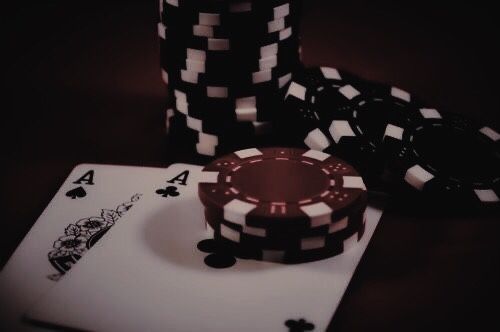
♠
The Timeline ->
1958 to 1978
The gap of twenty years was super intentional. By the late 50s, McCarthy was censured by the senate, the Second Red Scare and anti-Soviet rhetoric were slowly losing public support and popularity. My choice to include the Rats in the House of the Dead was mediated by that fact. The late 50s is also when the LAPD and law enforcement across the country started making psychological evaluations ( of suspect quality ) mandatory, starting in Northern California, actually. Kinsey's publications in 1948 and 1953 were explosive--especially to the stifling, extremely heteronormative, nuclear-family morals of post-war 50s America.
In 1970s, the term 'Serial Killer' officially enters the public's vocabulary. Despite not being an ongoing investigation, the re-opening of the Angel's Ripper case aligns with what is called the 'golden age' of serial killers. The 'second look' and the desire to re-sensationalize the case is due to Detective Dazai's belongings turning up, but also timely, as it would feed into the public's paranoia and fascination. I took some liberties with Los Angeles's mayoral election schedule ( which, if I'd been meticulous and historically accurate with, would have had TSP take place in the early days of 1977 or late in 1976 ). Los Angeles in the 70s was also suffering from serious smog--almost 200 bad air days a year. Akutagawa's lung condition ( which hasn't been touched on just yet with the exception of a throwaway lines at Tycheron and with Yosano ) is largely due to this bad air quality.
July 17th, 1958
The date of the Red Camellia murder was also chosen with intention. July, the peak of summer, rife with Americana, fireworks, and full California beaches, is everything the winter season of Camellia isn't.
Organizations ->
The Double Black
A bit obvious, really, but the club's logo of the two black Ace playing cards is an obvious nod to Soukoku being equally matched partners, even if in this au their dynamic is wildly different ( If anything, Chuuya has the upper hand in this one--even if he doesn't quite know it yet ). The Double Black is also described as more Golden Age of Hollywood-like, since Kouyou runs it and she's quite the traditionalist, I figured she'd cringe ( or pass out ) at the sight of plastic plants in the vases and blue carpeting.
The Golden Coast Guild
The TSP equivalent of Hearst corporation, run by William Randolph Hearst, a media company that covered everything from celebrity gossip to politics with over a dozen papers and magazines. Hearst became obscenely rich, and in real life, used his wealth to support Marion Davies, an actress ( and his mistress ), whose life he nearly ruined. F. Scott Fitzgerald ( the actual author ) loathed Hearst's willingness to print yellow journalism ( basically, bullshit ) and Jay Gatsby's mansion is loosely inspired by Hearst's home in New York, I believe. I thought it would be funny to combine the two. I also have a soft spot for Fitz in canon, even if he does speak with the sound of a cash register in every word and there's an American flag behind him wherever he goes.
Tycheron and the House of the Dead
First, Tycheron, Sigma's casino business, gets it's name from the Greek goddess of luck--Tyche--named Fortuna by the Romans. I couldn't call it the 'Sky Casino' because well, there's no sky. But a goddess is pretty up there. California gambling law is extremely complicated, but casino boats, docked 3 nautical miles outside of state borders ( usually from a point in Santa Monica, where the bay/bight made those laws a bit easier to work around ) were a neat exception--at least, until they started getting repurposed for WWII. So, Sigma still evades the law by being 'out of bounds' with The Angelica gambling boat. The casino business as a way for the DoA to stick their noses into the L.A. political landscape is also a loose reference to Bugsy Siegel, and the Italian-American Mafia's attempts to expand westward with the establishment of casinos and the nurturing of Las Vegas. Siegel's mansion, where he was murdered for his thefts from the Mafia, also inspired the Mori estate.
Characters ->
The Red Camellia
The real life Nakahara Chuuya was quite the romantic. His poetry is described as 'Bohemian,' so I thought having him be a bit of a drifter-like character, almost mysterious and unnatainable to his fans and SSKK in the present, would be a bit similair to how much of what we know of Chuuya doesn't come from the main story in canon, either. Combining that with Dazai's obsessive desire to lock him in ( haha ) with a comitted relationship and his serious levels of devotion, makes for a pretty interesting dynamic, I think. Though, Dazai's no Catherine Tramell, and Chuuya is certainly not Curran--BI's dynamic has been flipped almost completely with TSP, but the crazy is the same. And though I describe him as a drifter, that's not to say this au's Chuuya isn't fiercely loyal, it's just his loyalties haven't had the chance to be tested just yet.
I made the choice to have Chuuya called the Red Camellia in life because it's a direct subversion of other flower-tagged murders like: the White Rose murders, the Lilac Murder of William Desmond Taylor, the Black Dhalia ( inspired by the film, Blue Dhalia ), the White Gardenia murder, etc. etc. All of those monikers are posthumous, and created for the sole purpose of selling the story of a dead individual. Also, rather than having a journalist bestow it to him, Dazai is the one who comes up with it. Do what you will with that info . . .
Additionally, Camellia japonica is native to East Asia, not the U.S. It can survive here, but it will struggle. The choice to set the story in L.A., in a period of harsh post-war crackdowns on Japanese/East-Asian immgiration into California also influenced this title. It was also a choice made based on the appearance of 椿Tsubaki in Soukoku official art. Their Japanese meaning of passionate love and a noble death, also holds true here.
KEY LAPD Characters with interesting qualities
Sasaki Nobuko, Homicide Detective - reference to canon Sasaki's background in criminology and experience as a lecturer at a Tokyo university.
Captain -> Commander Fukuzawa Yukichi - Holds a position of authority similar to his role as the ADA's president in canon, but he's unenthusiastic about his career in the LAPD.
Note the lack of private eyes in the story so far!
Interesting PM Character references
keeping this light for obvious, spoiler-y reasons
Elise - Elise is intentionally a grown woman in this au. And a nurse! A reference to both her presentation in BEAST and the Great War in the main BSD storyline, and a reminder of the timeline ( she'd have been 8-10 years old in the past TL! ). Her feisty nature is also retained.
I was inspired by Lauren Bacall's Vivian in The Big Sleep, especially her meeting scene with Marlowe, when writing her meeting with Atsushi at the Mori Estate.
***SPOILERS procede with caution***
The Angel's Ripper
A reference to Los Angeles, but also Dazai's title as the Demon prodigy of Yokohama.
Ripper, rather than Killer being used because of the surgical nature of the deaths ( Jack the Ripper was thought to be either a doctor or a policeman ).
Films ->
some of my major inspirations for this fic are:
Chinatown ( 1974 )
The Maltese Falcon ( 1941 )
Vertigo ( 1958 )
Last Night in Soho ( 2021 )
The Batman ( 2022 )
The Third Man ( 1949 )
The Silence of the Lambs ( 1991 )
The Big Sleep ( 1946 )
and lastly, on a much lighter note:
The Nice Guys ( 2016 )
I couldn't get Gosling's outfits out of my head after watching it. I took one look and thought: I need to get a BSD character in this obnoxiously-70s blue suit yellow shirt combo ASAP.
Phew. What a mess.
This has largely been for me to keep track of my own thoughts and the tangled web I've been weaving with this fic, and it will likely get several updates over the course of me writing the second half of Part II and ( the much shorter ) Part III to TSP. But if you read it, and enjoyed it, I'm extra glad <3 I've been having a blast talking about my love for these films and this AU after keeping it bottled up for so long. I'm like shaken, corked champagne haha.
Signing off with the aesthetic of The Second Perspective's ending:


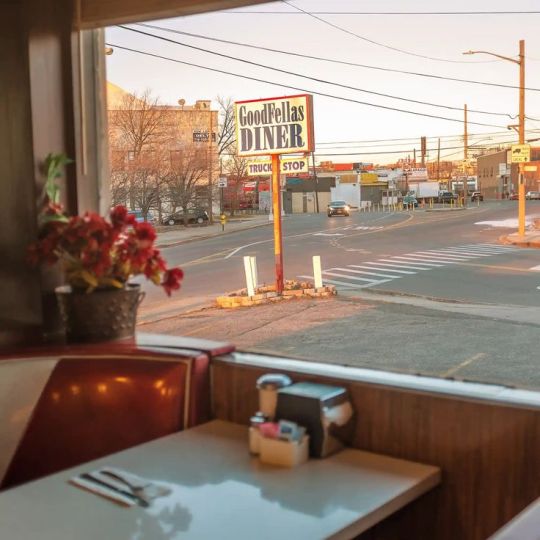
ty <3
42 notes
·
View notes
Text
Google’s push to lecture us on diversity goes beyond AI
by Douglas Murray
The future is here. And it turns out to be very, very racist.
As the New York Post reported yesterday, Google’s Gemini GI image generator aims to have a lot of things. But historical accuracy is not among them.
If you ask the program to give you an image of the Founding Fathers of this country, the AI will return you images of black and Native American men signing what appears to be a version of the American Constitution.
At least that’s more accurate than the images of popes thrown up. A request for an image of one of the holy fathers gives up images of — among others — a Southeast Asian woman. Who knew?
Some people are surprised by this. I’m not.
Several years ago, I went to Silicon Valley to try to figure out what the hell was going on with Google Images, among other enterprises.
Because Google images were already throwing up a very specific type of bias.
If you typed in “gay couples” and asked for an image search, you got lots of happy gay couples. Ask for “straight couples” and you get images of, er, gay couples.
It was the same if you wanted to see happy couples of any orientation.
Ask for images of “black couples” and you got lots of happy black couples. Ask for “white couples” and you got black couples, or interracial couples. Many of them gay.
I asked people in Silicon Valley what the hell was going on and was told this was what they call “machine learning fairness.”
The idea is that we human beings are full of implicit bias and that as a result, we need the machines to throw up unbiased images.
Except that the machines were clearly very biased indeed. Much more so than your average human.
What became clear to me was that this was not the machines working on their own. The machines had been skewed by human interference.
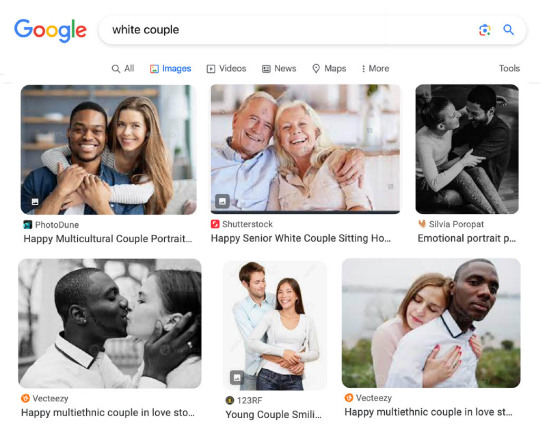
If you ask for images of gay couples, you get lots of happy gay couples. Ask for straight couples and the first things that come up are a piece asking whether straight couples should really identify as such. The second picture is captioned, “Queer lessons for straight couples.”
Shortly after, you get an elderly gay couple with the tag, “Advice for straight couples from a long-term gay couple.” Then a photo with the caption, “Gay couples have less strained marriages than straight couples.”
Again, none of this comes up if you search for “gay couples.” Then you get what you ask for. You are not bombarded with photos and articles telling you how superior straight couples are to gay couples.
It’s almost as though Google Images is trying to force-feed us something.
It is the same with race.
Ask Google Images to show you photos of black couples and you’ll get exactly what you ask for. Happy black couples. All heterosexual, as it happens.
But ask the same engine to show you images of white couples and two things happen.
You get a mass of images of black couples and mixed-race couples and then — who’d have guessed — mixed-race gay couples.
Why does this matter?
Firstly, because it is clear that the machines are not lacking in bias. They are positively filled with it.
It seems the tech wants to teach us all a lesson. It assumes that we are all homophobic white bigots who need re-educating. What an insult.
Secondly, it gives us a totally false image — literally — of our present. Now, thanks to the addition of Google Gemini, we can also be fed a totally false image of our past.
Yet the interesting thing about the past is that it isn’t the present. When we learn about the past, we learn that things were different from now. We see how things actually were and that is very often how we learn from it.
How were things then? How are they now? And how do they compare?
Faking the past or altering it completely robs us of the opportunity not just to understand the past but to understand the present.
Google has said it is going to call a halt on Gemini. Mainly because there has been backlash over the hilarious “diversity” of Nazi soldiers that it has thrown up.
If you search for Nazi officers, it turns out that there were black Nazis in the Third Reich. Who knew?
While Google Gemini gets over that little hurdle, perhaps it could realize that it’s not just the Gemini program that’s rotten but the whole darn thing.
Google is trying to change everything about the American and Western past.
I suggest we don’t let it.
There was an old joke told in the Soviet Union that now seems worryingly relevant to America in the age of AI: “The only thing that’s certain is the future. The past keeps on changing.”
34 notes
·
View notes
Text
Things That Never Happened in History Class
1. Professor Gadling's History 101
"... and so you see, Nan Boleyn was no 'femme fatale' homewrecking the happy Tudor household and leading the 'good' King Henry astray..."
There were snickers in the room.
"... though it makes for some pretty good stories, aye? Always love me a good bodice-ripper or that Jonathan Rhys-Meyers on the telly. He's a dish, that one." Professor Gadling leaned a bit forward, a naughty gleam in his eyes. "Though, the real King Henry was a looker when he was younger. Looked a bit like our Prince Harry, now that I think about it."
More laughter. Which was typical in Professor Gadling's classes. Iggy Pop - really, that was his name and yes, his parents loved him dearly - said, "Like, the dude's got a way with bringing all that historical stuff to life. Like he was totally there. Totally awesome, dude."
Iggy also had some of the best grades in the class, California surfer animated Pixar turtle accent and all. But the observation was accurate.
And it was also one of the reasons why Professor Gadling's history classes were booked solid every semester.
2. Nevermore
Sometimes, there was a raven on Professor Gadling's shoulder.
The first time he appeared, he was perched all nice and comfy on the professor's shoulder, looking as calm as you please, fixing the class with his beady black clever eyes.
The Professor sighed. "No, he's not me familiar. He's babysitting."
"You mean, YOU'RE babysitting him, right, Professor?"
The raven squawked in protest. Professor Gadling rolled his eyes. "He's the one doing the babysitting. I try not to pick arguments with ravens, you see. Terribly bad idea."
"Nevermore," said the raven clearly and drolly.
The class eventually learned the raven's name was Matthew.
3. There can be only one
There was a persistent rumor that someone once confronted Professor Gadling with an honest-to-God actual sword.
It happened in that secluded alleyway created by the old library and the faculty building, or so the story went.
The Professor, in atypical fashion, went, "Nope."
"There can be only one!" declared the sword-wielder, raising his weapon.
"Nope, I'm NOT that kind of immortal. You don't get to take my head, there's not going to be any ruddy lightning quick-thing whatever it is you lot call it. I'm not the droid you're looking for. Go off with you."
Apparently, Matthew the Raven helped drive whoever it was away - aside from the fact that the Professor was actually pretty good in a fight.
"Ugh, Pierson owes me THREE pints for this!"
4. Shakespeare In Love
There was a rule that got passed down from class to class.
For sheer unadulterated entertainment, get Professor Gadling to rant about William Shakespeare. Oh, he wasn't one of those who posited that the Bard never wrote his plays. Far from it.
He just absolutely had Very Specific Opinions about the man. And they were Loud, Pointed and absolutely Hilarious.
This was also good for distracting the Professor long enough to get out of any last minute homework or suprise quizzes. There was hell to pay during the next class, but it was well worth it.
"You are too harsh on dear William, sir," said the snow-pale young man in black, with the messy, rumpled hair.
The class wasn't sure how he suddenly appeared in their midst, although it felt like he'd always been there. He looked perfectly grave, absolutely serious... except for the glint of mischief in his odd dark blue eyes.
The professor crossed his arms over his chest, looking sourly at him. "He was a ruddy hack. Got a bit lucky, I'd say."
The pale young man smiled faintly. "He had a true gift that just needed a little bit of nudging."
A scoff. "Sure. Exchanged his soul for artistic immortality, Faustian bargains, deals with the Devil."
"No." The smile was still there and it was mesmerizing to see, as if this wasn't a man given much to that expression. "Just two plays, commissioned to order. What need have I for men's souls?"
"Hmph."
"Jealousy does not become you, Hob Gadling."
"Oi!"
"Uh... Professor, should we leave you two alone now? Like, this whole lover's quarrel UST thing you've got going is kinda cute, but we really don't wanna be around for the kiss-and-make-up part!"
Of course, it was Iggy Pop who just had to ruin what seemed to be the most interesting moment that had happened so far in Professor Gadling's history classes.
Someone raised a hand. "I don't mind being around for the kiss-and-make-up part!"
The class would later learn that the young man's name was apparently "Murphy."
He was also Matthew's "boss."
Any kissing and making up supposedly took place at that New Inn down the road, which also served, among other things, a delicious shepherd's pie.
- end -
NOTE: Yes, I did a Highlander reference. I couldn't resist.
#the sandman#dream of the endless#hob gadling#dream/hob#what have i done#i crack what i want#shhh no one tell neil#bwahahahahah#dream and the one time he made a sensible lovelife decision#such happy#very wow#losing his emo boi goth badge
614 notes
·
View notes
Text
i didn’t post a lot about what i did when i visited japan last year (aside from attending the tokimeki exhibition), but i did visit a lot of other retro manga spots as well, including the reconstructed tokiwa-so and the related shops in the neighborhood. in particular, i visited “tokiwa-so-doori oyasumi-dokoro”, a two-story shop and small museum, where they’ve reconstructed terada hiroo’s room in tokiwa-so, display a large number of signed shikishi from manga artists who have visited, and sell a large number of tokiwa-so merch, including amazing mizuno hideko merch and books!

so obviously i couldn’t hold back and bought a bunch. center top is a self-published book containing autobiographical texts by mizuno, and it’s a great read particularly because mizuno was the sole woman at tokiwa-so and has a distinct pov on the happenings there, and also because she hung out with ishonomori shotaro and akatsuka fujio a lot, giving us insights that are different from the fujiko fujio-focused pov that many texts on tokiwa-so take.
the postcards on the left depict the life at tokiwa-so with adorable cats, and i had to buy the whole set but i’m especially SO fond of this one:
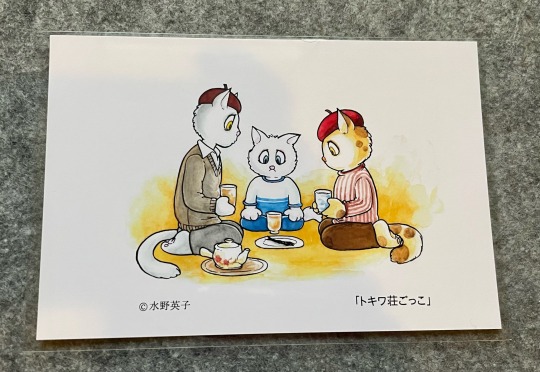
akatsuka fujio, mizuno hideko, and ishinomori shotaro as cats, staring at ONE dried fish wondering who gets to have it!! such a cute moment, and probably accurate to the pretty poor lives the artists led at tokiwa-so (except ishinomori, who was super popular almost right off the bat).
another amazing thing is that the tokiwa-so sticker sheet (bottom right) was printed BY MIZUNO, BY HAND, on her HOME PRINTER:

like, how could i NOT buy this!?!?!?
in general the reconstructed tokiwa-so and surrounding shops are amazing, and i’d recommend any fan of historical manga to visit. if you do go to the “oyasumi-dokoro”, also make sure to look up when you enter — the lampshade hanging right above you has been decorated by mizuno herself. amazing!!!
35 notes
·
View notes
Text
RotG and HiJack Recs
Alright, I'm building this list because some of these fics are just a tad dusty, and they could use more love. (A lot more love, I am literally dying from how much I adored these.) But note that a good few are incomplete.
Let's start with:
INCOMPLETE FICS
The Long Road:
Presently Gen, but Hiccup very much falls for Jack. He does however retain his feelings for Astrid, so bear that in mind. There's the classic Viking mindset when it comes to homosexual relationships that's pretty much giving Hiccup like a lot of anxiety.
But beyond that! I cannot shower this fic with enough praises! It gives me the same sort of excitement that the RotG movie does. Jack's characterization is Spot On. He's friendly and outgoing and also incredibly secretive and flighty. It balances out Jack's blunt mannerisms with a joyous charm and just that hint of vulnerability (which he keeps so well hidden lol).
The plots take place after HttyD, during the Riders of Berk TV series. Jack is folded into the Dragon Rider group who considers him some kind of Elf. Yes, this is Jack Frost in all his frosty glory. The way the story builds on a solid foundation of camaraderie and friendship, giving plenty of scenes to show how Hiccup and Jack became great friends, lends well to the Hiccup's realization of: "Oh I'm into him". Without giving too many spoilers, that "oh" moment is forever ingrained into my memory because of how PERFECTLY timed it is.
This blends Guardians of Childhood book verse with HttyD book verse, mostly via cameos over lore. Overall, a beautiful, fun, and simply enchanting read. I cannot recommend this enough.
A Story about Ice, Dragon Fire, and Belief:
Another gen fic. Mostly, it's about North looking at Jack and going, "he's my son now", and Jack having absolutely none of it. When placed together with Stoik and Hiccup's relationship, it becomes an almost interesting study of contrasts. North is the guy who's trying to prove something to a boy that he disappointed. Hiccup is the guy who's trying to prove something to a man that he disappointed. But ultimately, it ends up the same with a schism forming between the two pairs the harder one of them tries to breach it.
Also, it talks about how Jack is a force of fucking nature? And his blizzards can kill and have killed in the past? There's a little bit of trying to reconcile that with his new ID as a guardian. North is not doing a great job helping here.
But really the Crown Jewel of this fic is North and Berk's reactions to North (and by proxy his relationship to Jack). We go a little into the historical Viking side of things (like the pillaging et al), and apply that lens to this jolly old man. Let's just say some troubling (hilarious) assumptions are drawn. Also...
Everyone loves the sleigh.
I think this is one of the few RotG and HttyD crossovers that really do a good job of merging the two movies. Primarily because it's not just Jack in Berk. And this just made me hungry for more fics where more of the RotG cast arrive as Berk, and be just 100% fantastical and strange as the bedtime stories they are. Put some respect on the Guardians name, if you know what I'm saying.
In the Shadows of My Mind:
This one is an RotG only fic. No pairings except for whatever's going on between Pitch and Nightlight (and by proxy Jack). It's not a for real pairing. That said, it's such a complex and intricate relationship that doesn't resemble a romance but remains markedly intimate. Basically, this fic takes advantage of Pitch and Nightlight's ridiculously long history then throws Jack into the mix. Alive, human Jack in an early 18th century colonial town wherein he very recently did not drown (and boy, isn't that suspicious?)
My favorite thing about this fic is how spot on the dialogue feels? The lexicon, the syntax feels true to the time its set in. Although, I can't say that it is accurate as I'm not an expert of this time period in this region. Regardless, it certainly appears that a good stack of research went into this.
All that said, this fic has captured Bill Joyce's writing style the best, but with a deeper, more complex, more mature layer underpining that bedtime like vibe. There's a good host of OCs but genuinely, I didn't notice them as OCs. I could really believe they were characters of Joyce's books. Not to mention, they feel like fully fleshed out individuals even if they have like maybe two paragraphs of screentime.
The entire premise hinges on the idea of "what if Jack survived the skating accident" and everyone's reactions to that, as well as... the hidden secret thing that involves Nightlight. GoC spoilers are hinted so beware. But the little interplay between Nightlight and Jack is such a delicious little mystery, and also makes me so sad. These two boys deserved better.
Then we throw in Pitch for fun, because Pitch is always fun, and he just makes the whole thing even more complicated or as Jack calls it, "unnatural". But he's not even the main villain. It's Christianity. JK. That said, the fic does explore the idea of well, how would a fairly backwater colony be able to explain how Jack survived or... the powers that's slowly revealing itself from within him. There's a particularly nasty boy (around Jack's age), who is an OC and I believe an exceptionally well placed one. The OC understood his role to play and he plays it fantastically. Everytime he shows up, I too feel scared and indignant and excited all at once.
Speaking of great OCs, shoutout to Jack's Da. His appearances are brief but the impact is maximized with each appearance. He has that sense of realism and whimsy baked into him that I could gush endlessly about.
Overall, just a pure delight to read. Will re-read again and again.
Zastruga:
Total Gen fic. And a classic in my opinion.
I started reading this when I was in college - note the publish date. Nevermind the update date. Because even after all these years, this story? Still good. Still very very good.
This takes the original RotG plot and makes it more epic, and also more sad. RotG was very joyful at its core, which this fic somehow manages to retain. But it's just under a layer of sad. It's not overwhelming angst though, just enough to really pinch your heart.
Also whereas the movie has a few epic battles before things go really wrong, this fic stretches that out into a proper war against Pitch (and Jack). That's right. Jack is with Pitch ala Mother Gothel/Judge Frollo style. Jack isn't locked up entirely. He's given just enough rope to hang himself with. Mind the Jack whump is what I'm saying. But also do note that Jack's character remains as steadfast and loyal as he ever was in RotG, so the whump just hits nicer since this Jack isn't so irrevocably changed.
I have re-read this before. I will re-read this again. Nevermind the incomplete status. There's plenty of chapters that simply give me great joy.
COMPLETE FICS
It's the Great Spirit Sleigh, Hiccup Haddock:
Gen fic, in that there's no pairing actively getting together. But remains faithful to the original canon's hinted love interests. So Hiccup has a big crush on Astrid and Jack leans towards Tooth. That said, the relationship between Hiccup and Jack is just plain adorable and also heart-wrenching. They care about each other. So Much.
Now this is just a good holiday cheer. It literally has the Hallmark movie template, which is the point really. You know, the whole "oh no, a holiday is ruined" followed by "clever and charming ways to fix the holiday". With Hiccup and Jack taking the starring roles.
If you know your Hallmark movies, then you know that the leads get together in the end. And they don't in this fic. But the amount of "Gosh do I care about you" is so good. It's a lot of hurt and a lot of comfort. And I am here for it.
Also, this fic was completed way before the HttyD 3 movie so it doesn't have a canon compliant ending. That may be a bonus for some of you.
Scary Monsters and Super Creeps:
Pre JackRabbit (Bunny/Jack). But honestly the pairing isn't the main focus, mostly that Jack and Bunny admit to liking each other (but not to each other). So their dynamic remains in the best bros category. The pairing mostly shows through the plot machinations.
So long story short, Pitch opens the Guardian-Verse and recruits the other versions of the Guardians - the corrupt versions. And it's good, action/adventure fun. There's some gore, so mind that. Because the corrupt versions are nasty little things that fight dirty. Which makes the action feel like there's legit stakes. Also makes for a quick read because you must know what happens next? Did they get out of this sticky situation? Are they going to be okay? That sort of thing.
34 notes
·
View notes
Text
Ponniyin Selvan (The Book vs. Movie edition)
I've just today finished the five volumes of Kalki Krishnamurthy's epic historical novel Ponniyin Selvan, which was the basis for the two-movie series of the same name which I ADORED after I watched the first movie for the first time a couple of weeks ago. And ... I have some thoughts on the books and on the adaptation of the books. First of all, some general thoughts about the books:
I really wish I could read this in the original Tamil. In my understanding, these books are a beloved modern classic of Tamil literature, and the English translation, though perfectly fine and serviceable in terms of explicating the plot, rarely has memorable language.
Perhaps this is a function of the translation, or a different literary tradition, or the author's style (and I'll never really know which), but there is a lot of stuff that I can best describe as static. Actions and events are often described after they occur so as a reader, I felt distanced from what was going on in several scenes.
There are a LOT of coincidences (the entire Sembian Amuthan plotline is heavily based on coincidences) and repetition.
Even if I didn't know this was serialized, I would have guessed because of the repetition mentioned above, frequent flashbacks, and the padding out of some of the scenes. This isn't necessarily a bad thing (it reminds me of Dickens' novels, which I happen to be quite fond of) but it's definitely a hallmark of the novels.
I felt sometimes that Kalki was having a bit of a struggle with the historical characters having to do what they did in history versus his fictional characters like Nandini being able to do what they wanted. So sometimes I felt the characterizations were a bit lacking (and I definitely skipped some of Sembian Mahadevi's musings, SORRY!)
Now for the differences between the books and film versions (SPOILERS FOR THE BOOKS AND BOTH FILMS BELOW).
In general, with one exception I'll talk about later, I think the scriptwriters did an amazing job of adapting this immense series to film. In fact, for a number of things, I think they improved the pacing of the narrative and cut out extraneous stuff that detracted from the momentum of the main story - these were things that may have worked in a serialized novel but would have drowned even a gigantic six hour film series. All that follows is just my opinion, of course!
First of all, a fair number of characters were just cut out of the story, which I thought tightened up the narrative. (For example, Manimeghalai was completely unnecessary IMO for the story to proceed and she really detracted from the scene between Aditha Karikalan and Nandini when Karikalan dies; the intensity of that scene would have suffered from having anyone else observe it.) Poonghuzhali's brother and father (her sister-in-law Rakkamal is still there but not related) are gone in the film version. And that's all fine, I think it would have made things more confusing and I don't even think a tv series would have been able to use ALL these characters. (Also, I think I like that Poonghzhali seems more stable in the movie.)
I also liked that they cut out the astrologer. I thought the book relied way too heavily on the astrologer's predictions and while that may have been an accurate portrayal of 10th century Chola society, it also removed the jeopardy from the characters. If Arulmozhi Varman's sister would be confident that nothing terrible could happen to him because of the lines on his palm, then it was really hard to generate suspense about him within the story. (I mean obviously as readers/moviegoers we might know that he became Rajaraja Chola and therefore survived the assassination attempts, but his contemporaries and the fictional characters in-universe didn't know that he would end up being a great king.)
For me, it was more powerful to see how much the kingdom mourned him and his family mourned him than to have his sister shrug and be like "oh well, the stars don't say he dies so he's probably alive." And the way that they mourned him also helped develop their characters (To be fair, I also can't figure out what Kalki believed re:astrology either, because occasionally the author's voice is very skeptical about the astrologer as well.)
More controversially, I think they were right to cut out the whole Senthan Amuthan storyline about being the real son of Sembian Mahadevi and the previous king etc. etc. The hidden identity heir business was just way too melodramatic for me even in the book, and I don't think it would have worked at all for me in the movies. I mean, SA doesn't really even have much characterization in the book anyway (he's there a lot and helps out when he can but other than the fact that he loves Poonguzhali and has a nice voice, I couldn't tell you much about him.) Plus that would necessitate that Fake!Madhurantaka be Nandini's twin etc. and that would also have not been believable.
Now ... onto the main characters books vs. movie:
Aditha Karikalan: I honestly liked him much more in the movies than in the books. He was the tragic hero of the movie, with a clear arc, and Vikram brought oodles of charisma to his role. But in the books, he was a lot more opaque to me (his love for Nandini is not his focus - so he maybe falls in love with Manimegalai? - and that moment where he chooses to die isn't as crystal clear.) Also, Book!Aditha is a bit of an asshole towards all of his friends, frankly, which movie Aditha is not.
His chief faults in the movie are that he's ruled by his emotions (which is both why he sins against Nandini by beheading an unarmed man - Veera Pandyan - in a fit of rage that Nandini is pleading for his life AND why he tries to atone for that sin by committing suicide, which of course doesn't actually solve anything and in fact embroils innocent people like Vandiyathevan in a horrible situation).I still think he wouldn't have made a good king, not least because he would not listen to ANYONE'S advice, whether that someone was his grandfather, his friend, or his brother or his sister.
Book!Aditha might have made a better King - he actually goes to Kadambur not just to see Nandini, but partly in order to find out and allay the different Chola clans and possibly cement one of their loyalties by marriage to MM, so I thought that made for an interesting contrast. Even in the books, though, Kalki compares how the people mourned Aditha (as a great warrior whose absence threatened their kingdom's survival) and how they mourned Arulmozhi when he was believed to be dead (as a beloved son/brother even if they didn't know him personally.) The book (and movie though to a lesser degree because it's so preoccupied with Nandini/Aditha) has a lot to say about power and responsibility (so there are constant contrasts between not just Aditha and Arulmozhi but between the Pazhuvettarayar brothers and Arulmozhi - for example, over whether the Chola kingdom should supply the army in Elangai or whether they should live off the land. AMV is much more farsighted and knows how important it is to not make a conquered populace feel subjugated because they will rebel.)
Nandini: I feel like she was a lot more fleshed out in the film than Book!Nandini, and as she and Aditha were the emotional focal point of the movies, it makes more sense. Her motivations seemed clearer to me, and I also appreciated that we actually found out what happened to her, and she didn't just disappear off the page. I also liked, as mentioned above, that they didn't bother with the False!Madhuranthakan who was actually Nandini's twin etc. I liked that they fleshed out the love story between her and Aditha and gave Kundavai a role and also showed how it was Aditha's impulsive declaration that she would be THE Chola Queen that directly led to Nandini - who had done nothing wrong - being unceremoniously bundled off to wherever. (Would I also have liked a little more of how Aditha reacted to his family's banishment of Nandini? I think I would. Like we got a little bit of that in PS1 when he blames Kundavai for being jealous but not much more than that?)
Kundavai was very awesome in both book and film, but she had a lot less to do in the second movie. As I mentioned above, I loved that she actually believed her beloved younger brother to be dead so we got to see her reaction compared to Aditha's. (Aditha basically goes into beast mode and is like “I can fight whoever to avenge my little brother” and Kundavai is, as usual, a lot more rational even in the depths of grief.) I also really liked that brief scene the film gave us with all three siblings together which was a nice addition to the story. I felt there were not very many differences between Book! and Movie!Kundavai - although the book definitely played up her influence over her younger brother a bit more. She is the mirror to Nandini and maybe Nandini would have been like Kundavai if she had not had such struggles in her early life? I do like that in both books and movie, the female characters are so strong (I mean, well-characterized) and different from one another.
Vandiyadevan is just a great character! His resemblance to D'Artagnan was even stronger in the books (he had time for even more adventures) and his verbal sparring with Nambi was great and nicely translated to screen, I thought. I did think his presence in Kadambur and his (partial) witnessing of Aditha's death and aftermath was handled with more pace and worked better for me in the film (again, no Manimegalai was a great decision. And the picnic that Nandini goes on with Aditha and Vandiyadevan and MM and others (I think?) It was late at night when I was reading and I was like WTF so I might be misremembering it) dilutes the Aditha/Nandini meeting a lot. Anyway, back to Vandiyadevan - still sooooo charming. I loved Karthi in this role and am going to watch Kaatru Velliyadai (although I understand he's very different in that one!) sometime this week. But I found Book!Vandiyadevan lovely as well. I think his character translated perfectly from book to screen.
Arulmozhi Varman - I thought the books would focus more on him than they did, given that he's the title character. And I was a little surprised that he still wasn't the main focus of the books (though there's more focus on him in the later volumes), but there were some nice little character moments that I wish could have come into the movie. (Though there were a couple of things in the movie that I also really liked which showed his character beautifully.)
I read Kalki's afterword about how the pivotal scene in all of the books is Arulmozhi Varman's sacrifice of his crown, because that is an amazing thing for any ruler to do, to voluntarily give up his own power and step back. The books talk about the Chola ancestor Sibi, who was willing to give up his own life to protect a pigeon from an eagle because the pigeon was under his protection. I believe we are meant to understand Arulmozhi's sacrifice in a similar light. He is all about protecting the realm, even if it means sacrificing his own ambitions and that makes him Sibi's worthy heir. (In the Mahabharata, Arjuna is the peerless warrior prince, but his brother Yudhishtira is the Dharmaraja - the best of all; and I think we are meant to see echoes of Arjuna (and his son Abhimanyu, alone in the midst of his enemies) in Aditha and echoes of Yudhishtira in Arulmozhi.)
The books and the movie handle this immense sacrifice a little differently; in the book, we get a lot more motivation for that action: AMV is steeped in the history of the Singhalese kingdom and horrified by how bloody their succession battles were (he references fathers killing sons and vice versa more than once) and he is super clear that he doesn't want to bring that mess to the Chola kingdom or cause a civil war or anything like that. But there are two more elements as well, that I mostly got from the book: he truly loves Vanathi and she has sworn an oath that she doesn't want to be empress, so he can't have both Vanathi and the throne (but it's also a political decision, since if he's King, and marries Vanathi, then he'll be seen as privileging her clan above all others unless he marries a bunch of other girls as well). I also genuinely think he also wants to go hang out with Vandiyadevan and have adventures (while also doing the necessary jobs of fighting pirates and expanding trade and all that other stuff.)
The movies don't make that explanation as explicit, but there is this golden thread of self-sacrifice that runs through Arulmozhi's scenes in the movies as well: first of all, he refuses to take the throne of Elangai, though it is offered to him by the monks who crowned all the kings of the island. (This happens in both the books and the movie, but the books make this a more political decision - AMV says Elangai is too small for the scope of his vision, and that he doesn't want it to look like he's setting up a parallel second kingdom to the Cholas in opposition to his brother - whereas in the movies, it is clearly a matter of dharma. And the movie really sells that.)
Then Arulmozhi jumps into a stormy sea to swim to a ship full of people who want to kill him, in order to save Vandiyadevan. (I mean also some breathtaking confidence in himself that he and Vandiyadevan by themselves can defeat the Pandya rebels. He definitely does not lack for confidence :)) I cannot believe I actually forgot about this and had to come back and edit this post.I guess I am too used for Arulmozhi being awesome for this even to register on the scale?
The third self-sacrifice is when Arulmozhi is recovering from his life-threatening fever amidst the Buddhist monks at Nagapattinam. In the movie, somehow the Pandya assassins find out he's there and rile up the crowd which threatens to destroy the monastery which they claim is hiding their beloved prince from them. Although AMV is encouraged to slip away to escape the Pandya assassins, he refuses to repay his hosts by allowing their monastery to be destroyed. So he goes out to face the crowd, despite knowing that he's putting his life in danger by doing this. In the movie, he makes a choice to reveal himself and once again we see that Arulmozhi will always privilege the good of the people under his protection (the people of Elangai, Vandiyadevan, the monks, and ultimately the whole populace of the Chola Kingdom) over his own desires, and even his own life if need be. Over and over again, he shows himself to be the true heir of Sibi. (I also thought the elephant-goad plot was REALLY well done in the movie; even knowing obviously that AMV survived this, I was SO tense during that entire sequence. The book version just wasn’t as tense. Anyway …) So in the movie we keep seeing WHY Arulmozhi will be the great king he becomes but also why he will not take the crown at the end - and by not taking it, he makes himself all the more worthy of it.
In the book, in contrast, he leaves the monastery because there's about to be a devastating cyclone and it's not safe there any more. His disguise is revealed against his will by Rakammal hailing him as the prince; he's not given any choice in the matter. And he has very good and valid reasons for not wanting to reveal who he is which are also an excellent lead-up to his giving up the throne. Book!Arulmozhi wants to avoid a civil war over the succession at all possible costs. And he knows the public is fickle and easily swayed (there’s a whole subplot about there are rumors that HE had Vandiyadevan kill Aditha Karikalan so he - AMV - could be crowned, which only one character says in the film and everyone ELSE is like “Arulmozhi would NEVER!” But in the books more people seem like they are could be swayed by that thought - and giving up the throne to his father’s cousin is one spectacular way to give the lie to those rumors. And here’s also me, getting so angry on behalf of a fictional /historical character ;))
I think the movie version and the book version of this event both work really well for their respective media in terms of establishing who this man is, and what his character is, which lead up to his ultimate sacrifice.
The last sacrifice is, of course, that he give up the kingdom that *everyone* wants him to have. I think in both the books and the films, it's clear that the weird succession situation from his great-uncle Gandaraditha's day (where the throne when to the younger brothers of the king, and then to Sundara Chola - AMV's father - Gandarathia's nephew - rather than to Gandaraditha's own son) was bound to create a locus for discontent and coups egged on by the enemies of the Chola Kingdom. And that internecine strife is, from Kundavai's and AMV's perspective, what killed their brother and even put AMV in line to the throne at all. (They don't know all the backstory about Nandini and Aditha's guilt and his essential suicide. Also, I think it’s an interesting contrast between Aditha Karikalan who offers to give up the throne - once to the council of plotters where he says he’d do it if he had an army to go get himself another kingdom, and once when he proposes to Nandini that they just run off together. Arulmozhi had his chance at a kingdom won by force of arms - Elangai - and said no, and when he gives up the throne at the end of the books/movies it’s for love of the country he was expected to rule, not for love of an individual.)
The one thing I wish the movies had done was flesh out the Kundavai/Vandiyadevan and Vanathi/Arulmozhi connections. The actors did a lovely job with what they were given just from facial expressions and eyes (Vandiyadevan looks hopeless in love in the course of a single conversation when he's dressed as Krishna's uncle) and I bought into Vanathi and Arulmozhi's love for each other with nothing more than him reading her message in PS1 and a couple of times they looked at each other (so much love for Jayam Ravi and Shobita Dhulipala's facial expressions which sold the connection), but IT WOULD HAVE BEEN NICE FOR BOTH THESE COUPLES TO HAVE A CONVERSATION! But I realize I've seen a couple of Mani Ratnam's Hindi films (Dil Se, and Raavan - though I really want to watch the Tamil version of that) and he does doomed romance very adroitly. (Although from reading the plots of his several other films, apparently he also does do happy endings sometimes and I sort of wish we could have shifted the focus from Nandini/Aditha A LITTLE BIT to maybe just get a tiny conversation between these two other couples the I also loved. But at least I got some crumbs in terms of the full videos of the songs of "Veera Raja Veera" (for AMV/Vanathi) and "Aga Naga" (for Kundavai/Vandiyadevan. (FYI, the Veera Raja Veera video song is super hot - Rajaraja Chola is looking at his beloved while she dances as though she is an extremely tasty snack he can't wait to sample :P)
ALSO, if anyone wants to make PS3 with these actors I WOULD LOVE YOU FOREVER. In my head, it would be about Vandiyadevan doing wild stuff and flirting with EVERYBODY while Arunmozhi Varman sort of sighs and goes along with him to try and exercise some control over him* because Kundavai will kill him if anything happens to her boo, and they keep getting embroiled in weirder stuff and getting hit on the head (Vandiyadevan) and chilling out looking at Buddhist cave art and talking to elephants (AMV) and Kundavai just sits back and continues to run the kingdom (because she knows that AMV will not let anything happen to her boo). And of course, Nambi would be keeping an eye on both of them as well. Meanwhile, Vanathi is doing lots of dancing and going on some of the art tours with her husband, and also hanging out with Kundavai and rolling their eyes over their husbands. That would be totally fine!
*one of the things I loved in the books was that Vandiyadevan is influenced by Arulmozhi to be more truthful and upstanding, while Arulmozhi gets more devious after he meets Vandiyadevan. I feel this dynamic (along with the real-life bromance of Karthi and Jayam Ravi - every interview I've seen with them is the two of them having a great time!) would be AWESOME.
OK, this is insanely LONG again but I really enjoyed the novels and the movies - each medium enhanced the other for me, and in my head, the version of Ponniyin Selvan is what takes the parts I liked the best in movies and film. So Movie!Aditha and Movie!Nandini, BOTH the Vandiyadevans, Kundavais, Arulmozhi Varmans and Vanathis live in my heart :D
And I've also acquired Anirudh Kanisetti's Lords of the Deccan (which is more about the Cholas' predecessors and opponents like the Rashtrakutas and the Chalukyas) and Kamini Dandapani's Rajaraja Chola, which is about Ponniyin Selvan (but also about his predecessors and successors.)
#ponniyin selvan#Ponniyin Selvan 2#aditha karikalan#arulmozhi varman#kundavai#vandiyadevan#vanathi#aishwarya rai bachchan#vikram#trisha#jayam ravi#shobita dhulipala#mani ratnam
88 notes
·
View notes
Text
assigning ronance signature scents
because i am obsessed with fragrance and this is kind of like my hidden talent and i want to use it on robin and nancy.
this is not historically accurate because i really am just out here having a silly goofy time, i mostly just use this as a resource in my fics and wanted to share!
nancy:
starting with my best girl because i actually have info to help me with this! during the filming of s1 natalia bought a vintage bottle of charlie blue (which i also bought, as an experiment) to wear and get into nancy’s headspace (it was literally awful. she made joe keery sneeze or cough according to the story). but to get to the point, charlie blue is a floral fragrance, leading me to pick two floral perfumes for nancy. more specifically, i picked “pure white linen” from estee lauder (left) and “sun moon and stars” from karl lagerfeld (right).

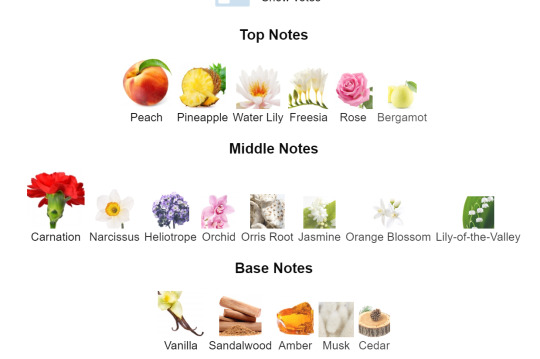
not only do i think nancy would stick with florals, i also think she'd stick with name brands (like what you could find at macy's). charlie blue is a revlon perfume, so it led me to believe that while the wheelers have money, they aren't exactly spending it on something like fragrance that is just going to be drained. i also think karen may have bought nancy her first fragrance based on what she knew, because that's what her mother did, and nancy never bothered to venture out until she was older. "pure white linen" gives me daily use vibes, while "sun moon and stars" is more special occasions/dates. i also think she has a permanent lingering smell of ink and paper but that's not featured here.
robin:
oh robin. to the surprise of no one, these are a bit more gender-neutral to masculine than nancy's. when thinking about robin, i wanted things that were masculine, but still had a touch of softness and sweetness to it. fragrance has no gender, but a lot of masculine fragrances created in the 1980s were very masculine (think branding for men like GLACIER ICE FREEZE vs soft vanilla woods for women) so if she were to buy fragrance in the 1980s, i think she'd steal steve's cologne or spend five hours trying to pick a cologne that is slightly less overly masculine. that all being said, i picked 'skins x vilhelm' by vilhelm parfumerie (left) and 'ambre topkapi' by mdci parfums (right)
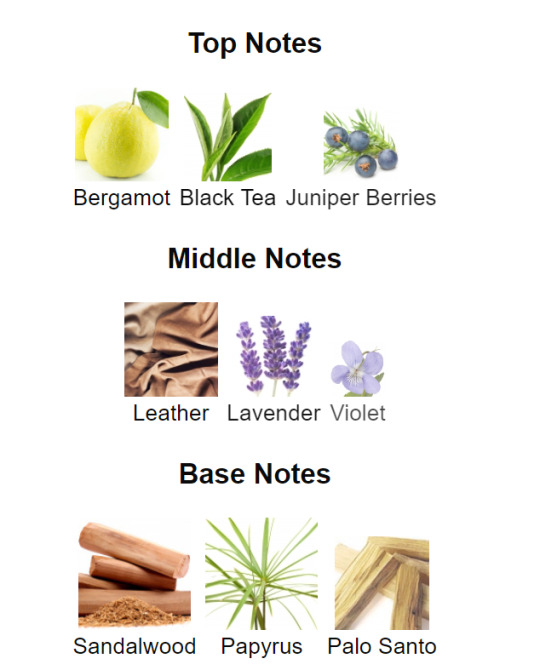
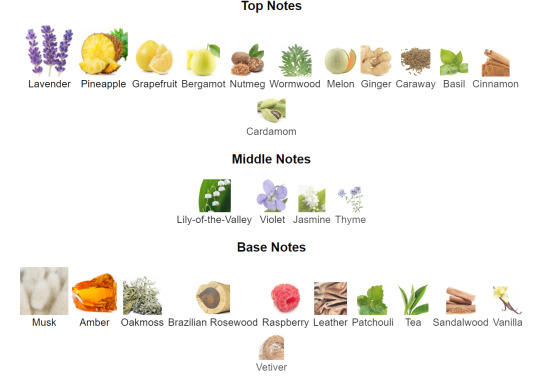
as you may notice, there's a lot of lavender, sandalwood, leather, and tea in these fragrances. that is completely on purpose, because i find that those pull especially gender neutral-masculine on a lot of people that is soooo appealing. they also don't flag incredibly masculine on first sniff, making it so most people can get away with wearing them and not smelling like a forty year old man named Tim that works a 9-5 and plays golf. the floral and spice notes work as countering pairings of each other but in the best way, and i could totally see robin wearing this in her full butch glory. also, the queer history of lavender is not to be ignored and robin certainly wouldn't ignore it. to me, i see robin wearing 'skins' on a more day-to-day basis, and 'ambre' as a special occasion/date thing.
anyway that's it! i love talking about fragrance and i don't think i've ever really talked about it here except for the coco chanel poll so PLEASE talk about it with me if you'd like.
#yes i posted this on twitter#but i only have so much room there#this gives me all the room to yell#also ronance server saw it first#happy 4th enjoy my rants#ronance#stranger things#kat speaks#nancy wheeler#robin buckley#nancy x robin#robin x nancy
52 notes
·
View notes